#assassins cred origins
Note
Do you prefer your Riddler to know Batman's secret (Like in Hush) or still be obsessed with the big riddle?
This is a very fun question because ORIGINALLY when I created this blog. My Eddie didn't know Batman's identity. This is because I actually love the idea that Eddie could easily figure it out. BUT. He refuses to because he projects his father on to Batman. He likes to think of Batman as his father so he can get "revenge" on him. Plus, Batman reminds Eddie so much of his old man. If Eddie knew what face was under the cowl, it could ruin that fantasy for him.
HOWEVER
When I created this blog nearly 3 years ago, I haven't read Hush yet. After reading it, and after thinking about how Eddie came close to figuring out Batman's identity in Ark Origins. I reconsidered it. Hush introduced a very good idea that was immediately discarded by DC because they're creatively bankrupt and only rely on already popular characters for quick bucks. That was Eddie being a mastermind like character. And you see. Many of the other rogues are also super smart. While sometimes Eddie is credited as one of the / the smartest villain. It just doesn't really... make him special compared to the other rogues who are BOTH smart AND fighters/strong. Intelligence is literally all Eddie has. I feel if Eddie knew Batman's identity, it can show you how special his brand of intelligence is compared to some of the other Super Smart Villains. It can also make Eddie into more of a mastermind character as I've stated before. This could've made for interesting comics where Eddie fucked with Bruce's personal life. (Plus it wouldn't have been too sus, given that Bruce is the richest man in Gotham - most would assume Eddie was just doing it for wealth and recognition)
In my lore, Hush is mostly canon. Just because I feel it's a big feat to give Eddie some cred as a threat in the underground. (As well as showing off his manipulation skills) and well... since I have ideas for a fancomic or something, the Hush plot will become Relevant again eventually.
So, by default - my Eddie knows Bruce is Batman. The only times I write him as not knowing is when I'm writing with a Bruce/Batman and I haven't asked them if they're cool with that yet. My Ed also won't tell anyone the Secret though just for the same reasons in Hush - doesn't wanna potentially get in trouble with Rai's and his league of assassins.
#( 🧩 ✧ INFERIOR PUPPETEER ✧ | OOC )#( 🧩 ✧ SENT TO ARKHAM ✧ | INBOX )#// so usually when i'm writing with most ppl - ed does indeed know it <3#// just has Zero Reason to bring it up tho
5 notes
·
View notes
Text
I mean...
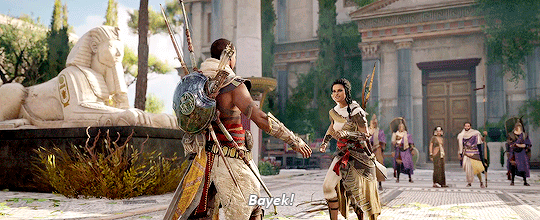
#how can i not#adopt#these two#as#my parents#they're so adorable#but i was spoiled with aco's ending#lowkey trying to learn how to write a domesticated romantic assassin couple for that one oneshot request#highkey loving aco#bayek#aya#amunet#bayek x aya#assassins cred origins#assassins romance
6 notes
·
View notes
Photo

The Curse of the Pharaohs (Assassin's Cred Origins/ DLC ) by Eddie Bennun https://www.artstation.com/artwork/rQY3e
7 notes
·
View notes
Text
Gosh I hate the present time sequences, fucking Abstergo bitch.
1 note
·
View note
Text
Who are you, Miss A-Yue?
It turns out I might be a clown of the greatest calibre! Or... am I?
The thing is, you see, that for some unfathomable reason I became convinced A-Yue was a ninja maid. Which... may not be, in fact, entirely correct, as @girllovescomic had promptly pointed out. Alright, I said. And immediately went to investigate where this possible misunderstanding could be coming from. The results are not entirely conclusive, yet very interesting nonetheless. There are lots and lots of tiny details, which make little sense... unless one assumes that A-Yue is supposed to be Awu’s bodyguard.
The thing is that A-Yue is not among Awu’s original Wang maids. She’s nowhere to be seen in Wang Manor and I cannot spot her in that flock of maids attending Awu during the original wedding. Unless I am more eyesight-impaired than I thought myself to be, this means she appears only later on. But when?
Not during the siege of Huizhou, I can tell you that much. Not during Awu’s visit to Wang Manor after her return to the capital nor upon her entrance to Yuzhang Manor... Why, it seems like the first time we see A-Yue is in the aftermath of Yuxiu’s brave defense of Awu and her subsequent wounding. Awu comes back home, is accosted by Zitan, speaks to a noticeably worried Song Huaien and the next thing we know, she’s being served by A-Yue. This doesn’t have to mean anything, but it looks rather suspicious for an obviously important maid, one clad in an outfit practically identical to Yuxiu’s, to simply appear out of nowhere.

And then A-Yue proceeds to escort Awu back into danger zone, that is, to the Imperial Palace. About five minutes after an unexpected assassination attempt. What’s really interesting is that she keeps very, almost unnaturally close to Awu on this occasion, following just a step behind her at all times. It could mean nothing, of course. And yet, isn’t it remarkable that this relative newcomer is the one accompanying Awu and not Su Jin’er?
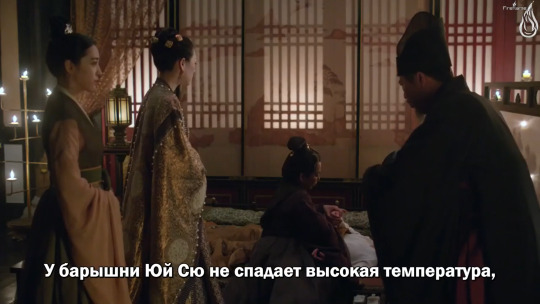
It could also be completely coincidental that she is present while Song Huaien thanks Yuxiu for covering her mistress with her own body. Or... is it? You did what I could not, he says, while A-Yue listens attentively from behind Yuxiu’s shoulder.
Another thing: A-Yue makes something of a habit out of physically supporting other people, be it Yuxiu or Awu. And now that I think about it, it does look like she is always prepared to steady or even catch her charge, as needed.
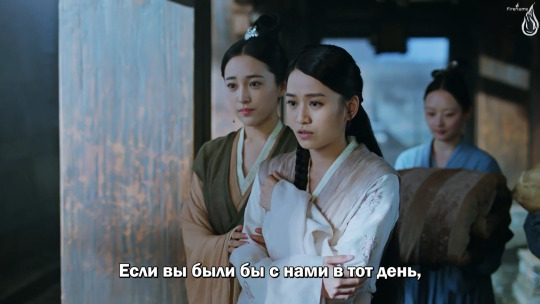
The next thing we know, a very rude eunuch turns up at Yuzhang Manor with an armed escort. If you watch closely, it’s obvious that A-Yue walks one step closer behind Awu than Su Jin’er. And Su Jin’er has the highest possible status of all female attendants barring Auntie Xu. Once things become tense and men start aggresively posturing, Su Jin’er keeps staring ahead, while A-Yue rather noticeably casts her gaze around. Hmmm, could she be assessing possible dangers to her mistress? Who knows...
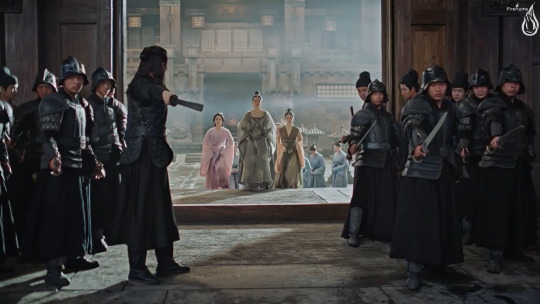
And again, when Awu walks down the stairs to the provided carriage, A-Yue is the first to follow.

She is then forbidden from accompanying Awu any further, but it’s a rather curious detail all the same.
Next, Su Jin’er is the one who goes with Awu to see Zitan on his deathbed bedrest, which is something that Xiao Qi very much does not approve of. True, Su Jin’er is Zitan’s acquitance, while A-Yue is not... but if that was the only reason, then why doesn’t she go with Awu to visit Jinruo? Instead, A-Yue and Nanny Xu are the ones that do that. Also, guess who runs to Xiao Qi when Awu drinks herself into unconsciousness? No born and bred Wang maid would do that, not as her first resort. And you know what? Xiao Qi allows himself to show some actual exasperation while in her presence.
During Daddy Wang’s coup A-Yue is nowhere to be seen; this time Awu chooses to take Pang Gui with her. Which is understandable, since he’s bound to be better in an outright fight. After the coup... guess which maid gets asked about whether there are any news from Xiao Qi when he’s nowhere to be found late into the night. And which one accompanies Awu and Xiao Qi to Yuzhang Manor when they go to greet the Screechers. Xiao Qi could have very well been the one to choose A-Yue for this outing as Awu would have needed to dress and get ready after her morning lie-in. Also, it would make sense, since I suspect Su Jin’er or Nanny Xu would be Awu’s natural choices for any visits to her childhood home.
Song Huaien is a man on a mission... and he chooses his allies wisely. He, ah, covertly calls A-Yue away from her daily tasks and asks her to play messenger...


...which she teases him for rather shamelessly. But not like a maid with little to none previous acquitance with Song Huaien would do. She’s mean in a very sisterly way, not giggling about his awkward courtship as Yuxiu’s friend might have done, but instead directly making fun of Song Huaien himself. I wouldn’t have expected our general Song to give flowers to a woman, she says, which makes me wonder how would she even know what a total mess he is with such things. Unless she was a Ningshuo girl, that is.
A-Yue’s involvement in the medicine caper is also very interesting. She is the one who makes Awu’s contraceptive tea and reminds her that she should take it. Moreover, her reaction to Auntie Xu taking it away is telling.
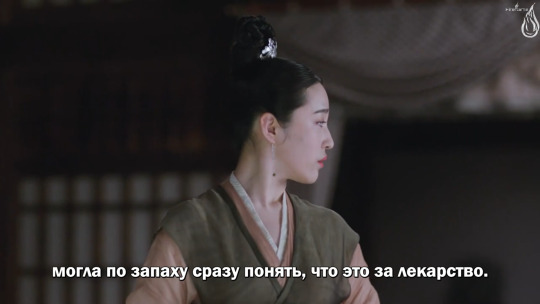
She doesn’t protest when Auntie Xu says that the tea might have been steeped for too long. She just turns, observing very closely and even worriedly as the tray is carried away, while at the same time listening to Auntie Xu’s somewhat incoherent muttering. Yet A-Yue catches all of it, why, she even smiles - somewhat condescendingly - at Auntie Xu’s claim of having an excellent nose. And she is so focused on that tray that Awu needs to call her back to reality. But why? I think somebody here might be in cahoots with Xiao Qi, don’t you? It only becomes more plausible as A-Yue turns out to be the one responsible for keeping custody of medicinal herbs.
I also don’t buy her reaction to Auntie Xu’s outright panic in the kitchen. It’s obvious that something is very much not okay, yet A-Yue shows no serious worry. Oh, she asks the right questions and puts on a mask of concern, yet at the same time doesn’t seem eager to investigate further and shuts up when Auntie Xu tells her not to ask any questions. Hello, A-Yue is no cowed housemaid. She makes faces at Auntie Xu and Screecher both, she teases Song Huaien, she acts like an older sister to Yuxiu and doesn’t keep proper distance from her mistress. And now she just shuts up? Yeah, no.
Her behaviour around those herbs is also pretty sus. She’s a bit too helpful in fact, rushing to unwrap them even as Nanny Xu already does the same and she announces herself in a very rehearsed way when she brings back the remaining supply. Here I am, Auntie Xu! Really? What’s more, she doesn’t make a peep when asked to sneak out and discreetly summon an unfamiliar doctor. She simply nods, as if making some calculations in her mind and rushes away. Methinks somebody went to inform Dawang before summoning that doctor. Why? Well, Xiao Qi stops in place once Nanny Xu touches upon the subject of Awu’s medicine. Could be guilt. Could be that he already knows she’s onto him.
Enough about the herbs. Instead, let us look at other outings. Awu wants to keep her first meeting with Helan Zhen secret... and so Su Jin’er is the one to accompany her. Then Su Jin’er falls sick, but she’s healthy again by the time Awu goes to dance for Screecher’s freedom. Coincidentally, by then there is no need to keep secrets any more; Xiao Qi already knows what’s what. And look at what happens when Awu and Helan Zhen go for a walk.
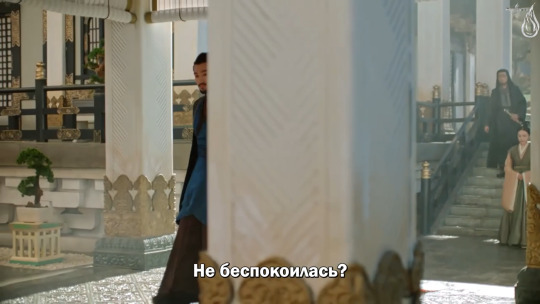
I’m not saying that A-Yue could take out Helan Tattoo. I’m also not saying she couldn’t. Awu knows that she could be walking into danger, so why not take Pang Gui instead? Ah, we’re trying to appear friendly and accommodating? Then A-Yue is a much better choice. If she is a bodyguard in the first place, that is.
Next suspicious thing, although that could be a matter of translation: when A-Yue speaks of Awu going with Xiao Qi to Ningshuo, she refers to it as returning there. Hey, A-Yue, your Ningshuo cred is showing!
Then, when Awu in on the run, she’s very sure that Miracle Baby will be safe traveling alone with only Nanny Xu and A-Yue to protect him and get him to Turnip. Let’s face it, Nanny Xu is not somebody who should be entrusted with what amounts to a covert mission. And yet Pang Gui goes with Awu and Su Jin’er, while A-Yue takes charge of Miracle Baby and Auntie Xu. Miracle Baby is much more vulnerable than Princess Yuzhang, so how come Awu divides the group this way? Unless she absolutely doesn’t trust Pang Gui to behave in a discreet manner... or A-Yue is indeed a secret operative. Or both.
Let’s skip to Awu’s confrontation with Turnip over Auntie Xu’s grave. Pang Gui is the one to invite Turnip to come... and yet it’s A-Yue who remains present during the actual conversation. Could it be that Pang Gui taking her place would be too much of an overt threat? Yeah, okay, that one is a bit of a stretch. And so is this picture:

Very symbolic, don’t you think? It looks as if Ningshuo soldiers are standing guard over Awu. Okay, back to actual proof!
A-Yue, who had never really taken part in dressing Awu or putting up her hair, suddenly does just that as Awu gets ready to play her part in Xiao Qi’s fake coup. Battle music and all. It could be that she’s the last close attendant to be left standing. Which she is, now that I think about it. But it’s also pretty neat that she’s the one to dress Awu for war. And then...


How many ninjas can you see on this picture? Because I see six, five in black, one is salmon. Why would Awu take a maid with her to the palace in the middle of the Yuzhang Acting Company performance? That doesn’t make sense, they’re practically going into battle.
And again, look what happens once Xiao Qi is supposedly gone and Awu is expecting an attack any moment. She doesn’t take Hu Yao with her. Not even a dressed up Hu Yao! She takes A-Yue.
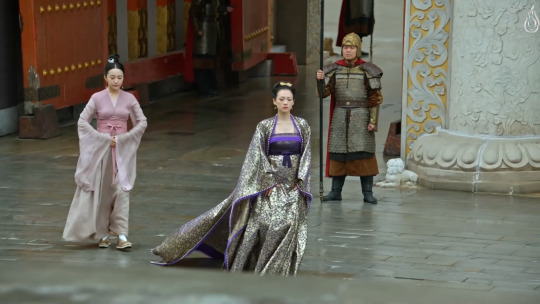
How would a maid - and not even a palace maid at that! - help in evacuating Zitan?
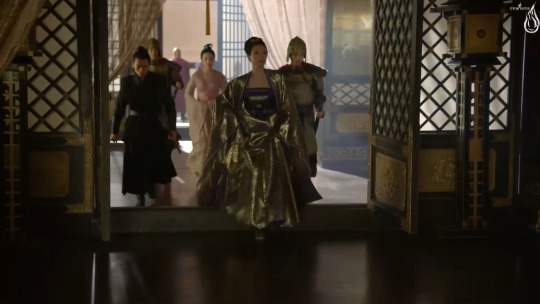
And yet she does. The moment they hear enemy troops moving through the secret tunnel, two people rush to pull Awu back. One has a very respectable reaction time. And it’s not Pang Gui the Inept Ninja.
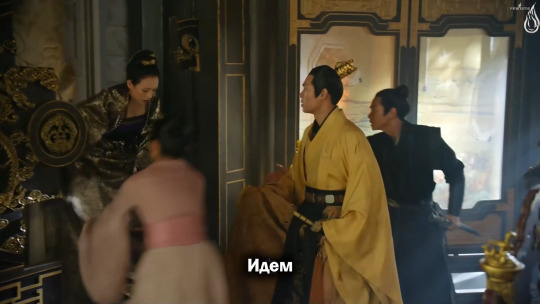
One bodyguard rushes the client to safety, looking back from time to time just in case, while the other covers their retreat.
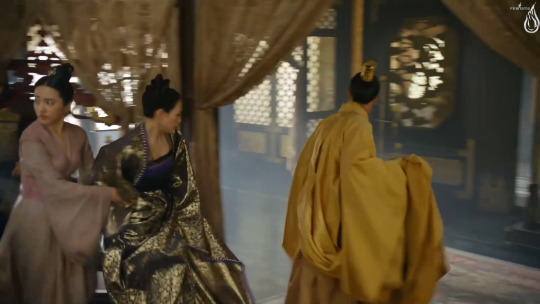

Pang Gui is in the know! He must be, since he stays behind to stop Song Huaien’s Mooks, letting Awu charge into unknown danger with only Zitan (oh so useless), his two attendants (also useless) and A-Yue (potentially immeasurably useful) for company. The whole time they’re running through the palace? A-Yue sticks to Awu like a burr, steading her every time she falters. This girl is a bodyguard and a well-trained one to boot!
And oh look, somebody keeps turning to stand face to face with danger, even as Zitan’s attendants huddle behind her.
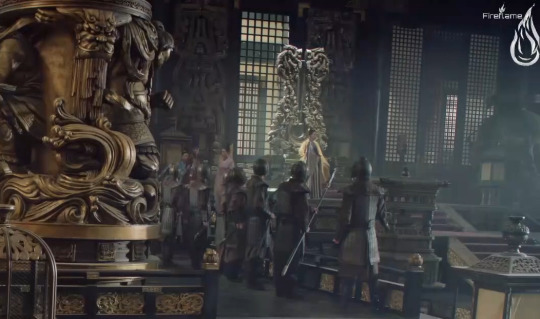
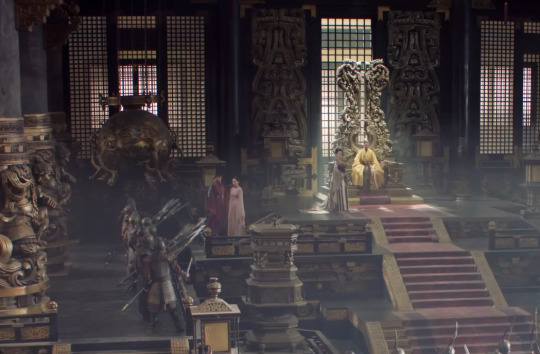
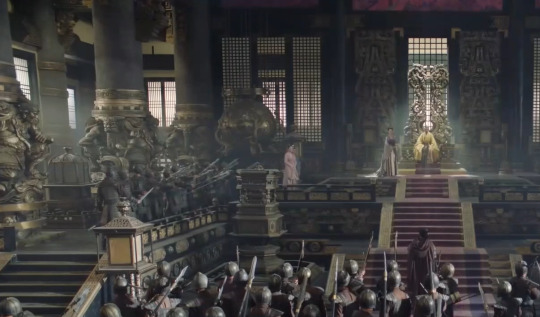
Once cavalry arrives, A-Yue sprints for Awu and pulls her out of the way, just as Tang Jing commands his people to protect their Princess. Then, perfectly in accord with Tang Jing’s next command, A-Yue gets Awu to safety.

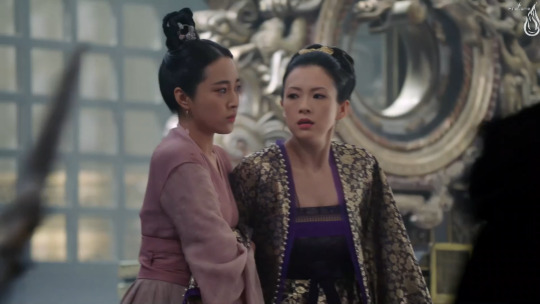
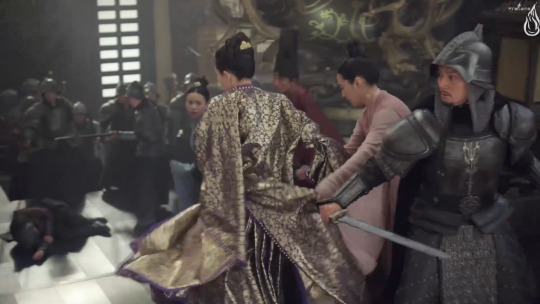
Have I mentioned that A-Yue keeps looking around in a very cold, professional way? This is no brave maid, this is a skilled operative searching for potential threats to her VIP. Neither Tang Jing nor any Ningshuo soldier tries to help Awu and A-Yue, they just cover them. Could it be that they know Awu is in good hands?
And that’s it. Now, coincidences happen. But what’s more probable? That A-Yue is a normal, if very brave and dependable maid... or that she is Xiao Qi’s agent, carefully handpicked to protect Awu and seamlessly integrate into her entourage at the same time? Those two ninja maids Xiao Qi presents to his wife in Huizhou are good fighters, but they don’t exactly make the best maids. Let’s say, though, that they were all he had at hand in Huizhou. But what would stop him from sending for another guard? One who would wait for Awu’s arrival in the capital, rapidly learning all there is to know about being a personal attendant.
So... am I a clown or not?
#the rebel princess#monarch industry#or maybe I am just pulling it out of thin air#anything not to admit to my mistake#but I wouldn't be so sure about that
26 notes
·
View notes
Text
My Review of CSC's Production of Assassins, or someone forgot their mask and an usher took them outside, I heard a gunshot but I think it was unrelated.
Below is my review of the 11/20/2021 matinee of Assassins, more or less. The formatting is a bit weird on here, but I hope it doesn't deter you too much, and I hope you enjoy! Also, this may contain minor spoilers for the show.
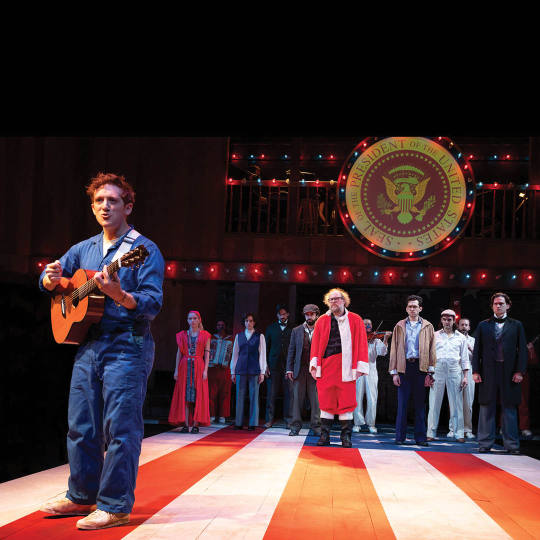
photo cred Julieta Cervantes x.
This afternoon I had the pleasure of going into Manhattan and seeing Classic Stage Company’s production of Assassins. It’s a dark Sondheim musical with a bit of a rocky past, a show that never seems to come out at the “right” time. It first premiered Off-Broadway in 1990, as America “just fully embraced the Gulf War.” The country was hyped-up on patriotism, and the show was ill-fated to make a Broadway transfer. Roundabout Theatre Company was going to revive it on Broadway 10 years later, September 2001. It was, for obvious reasons, put on hold again, but when it was revived in 2004, it held fast, garnering Tony awards, high praise, and a Broadway cast recording. (There is also an off-Broadway original recording, and there was a London production). Needless to say, the Assassins I saw was set for CSC’s beautiful intimate theatre, and the cast were well into the rehearsal process. The month was March, the year 2020…. And then you know the rest. It returned in previews on 11/2. As you can imagine the musical, like its subject matter, struggles at times to find the right audience, to find its right moment.
I’d beg the question: is there ever a wrong moment for this story to be told? Inspired by a play written by Charles Gilbert Jr, and made into a musical with readings in 1979 with music by Stephen Sondheim and a book by John Weidman, Assassins follows 9 people in American history, 4 of whom successfully assassinated a president. We see oddly familiar characters in American pop culture and history, like John Wilkes Booth and Lee Harvey Oswald, as well as a handful of other figures, whose assassinations and attempts don’t garner nearly as much airtime or conspiracy documentaries and deep-dives. I am not the best with U.S. history, and while I knew there were other assassinations and attempts besides Lincoln’s and Kennedy’s, Assassins gives just enough detail on these others, working as a bit of character-study. The show imagines the minds and motivations of the lesser-known “villains” of our great nation. I learned of Leon Czolgosz, who successfully shot and killed William McKinley, of 2 failed attempts on Gerald Ford’s life, the first (and so far only) legitimate attempts women made on a president’s life, and the slightly confusing tale of Charles Guiteau.
The cast is simply STACKED, and includes Broadway heavy-hitters like Will Swenson (Guiteau), Steven Pasquale (Booth), Ethan Slater of Spongebob the Musical fame, who plays an impressive double duty as the Balladeer and Lee Harvey Oswald. It also includes an immensely talented ensemble, who trade off duties as announcers, witnesses to presidential murder, accomplices to assassins, and- oh yeah- they play multiple instruments while they’re at it. This is a sort of calling-card of director John Doyle’s work, whose similar staging and stripped-back versions of Company and Sweeney Todd have received criticism and acclaim. In Assassins, cast members employ instruments to keep everything in close-quarters, and they often use traditional folk instruments to imbue history- history in sound that is already built into Sondheim's score. Although there was a small orchestra pit hidden away behind the presidential seal, the musicians incorporate the music in a unique way, and heighten the strange, surreal feeling of the show, and its carnival game-like setup. Toting guitars, banjos, playing beautiful violin and flute arrangements and clad in red, white, and blue boilersuits, they certainly stand out. The CSC stage is painted with a bold American flag, and acts almost as a catwalk, jutting out into the crowd, where seats surround it on three sides. It is essentially a theatre-in-the-round, and sitting only about 175 people, there isn’t a bad seat in the house. The actors stare and smile, look about pleadingly, and above all, wave many, many guns about.

photo by Julieta Cervantes x.
The show starts with The Proprietor, played enthusiastically by Eddie Cooper, who convincingly offers guns to the cast as they come into view. They sing “Everybody’s Got The Right,” and the Proprietor, along with Bianca Horn, who in part plays Emma Goldman, act as part carnival ring-leader, and part armorer, convincing the desperate and groaning would-be assassins to pick up a gun from their folded American flags, as “everybody’s got the right to be happy.” Leon Czolgosz is singled-out first, a nervous and wary Polish-American played expertly by Brandon Uranowitz. Soon, others follow, and the cast moves around the stage, leaving John Wilkes Booth to become our first assassin. He screams “Sic semper tyrannis!”, and our musical truly begins.
The show weaves back-and-forth a bit through history, checking in on Lynette “Squeaky” Fromme played by Tavi Gevinson and Sara Jane Moore, played by Judy Kuhn. While the two didn’t conspire together in real life, they have a similar target, and similar interests it seems. The show fictitiously pairs them together, allowing them to play off their differences, which are of the normal sort, one believes Charles Manson is the son of God, and the other thinks Colonel Sanders looks like her father. We check in occasionally with Samuel Byck, played by Andy Grotelueschen. He’s clad in a bright red Santa suit, partially disheveled, and rambles on to Leonard Bernstein with the assistance of a microphone, a tape recorder, and a plan to send off his cassette when he finishes talking. Byck is one of the failed assassins, but garners an impressive amount of time in the musical. He is a highlight, and his appearances are mostly solo, which allows Grotelueschen to shine with long, humorous monologues and rambles, where he breaks into song, albeit to bitterly quote West Side Story.
No role feels too small amongst our assassins, as the failed and successful have just about the same amount of focus on them. Will Swenson’s Charles Guiteau finds himself hamming-up the audience during the scene where he shoots James Garfield, who appears in the form of a picture, like all the other presidents, on a round screen above the stage. Swenson spins around and dances, oscillating from reciting “I Am Going to the Lordy” almost somberly, to cakewalking around for his character’s ballad. In other parts of the show he teaches a character how to hold a gun, and like Wesley Taylor’s Giuseppe Zangara, seems to not have many regrets.
One by one, we focus-in on our killers and wannabe killers, who clutch their stomachs in pain, shoot repeatedly to no avail, and find themselves at the end of a noose. If not anything else, Assassins highlights a sort of person fueled by desperation, fueled by the need for acknowledgment. Some answer to their higher power, “Squeaky” Fromme believes killing Ford will allow her to reunite with Manson in court, and John Hinkley Jr. is driven by his obsessive love for Hollywood star Jodie Foster. Both believe killing the president will earn them love from those they admire, which gives us the duet “Unworthy of Your Love,” a song not only beautiful and creepy, but fascinating. Like much of Assassins, “Unworthy” sees two people from different moments in history interacting, and it places Hinkley and Fromme together, to highlight both their desperation, and their foolishness.

photo by Julieta Cervantes x.
Santa-clad Hyck and an often doubled-over Zangara have the most unclear motives, with the musical having us believe Hyck is trying to make a statement by dropping a plane on the White House (although, what statement?) and the Zangara needs to do something about his stomach pains. Guiteau felt he was owed a job from President Garfield, and while it becomes a bit of a witty refrain “would you like to be the wife of the Ambassador to France?” he asks Sara Jane Moore, it is just another testament to the desperation we see. All the characters are clutching onto an idea of the American Dream, of a country or a people that have failed them.
Uranowitz’s Czolgosz is fueled in part by love, but mostly out of the need to do something, anything about his life, and feels to be written the most complexly. Throughout interactions with the others, and during an inspired performance of “The Gun Song,” we learn Czolgosz feels beaten down and tired. He works a factory job, making 6 cents an hour, he feels what he does is not enough, and he feels he was cheated somehow. Uranowitz’s Czolgosz speaks with a considerably strong Polish accent, and his eyes glitter, often with tears. He begins following an anarchist activist, wishing to do something about his own helplessness, about the job he cannot “just quit,” as a character jokes, about the country that forces him to work while other men are lauded and applauded, waving behind podiums.

Photo by Julieta Cervantes x.
The faults with Assassins feel small, and are built into the musical itself, not this unique production. In a perfect world, every character would have their own moment, their own explanation, and their own song. The CSC performance was 125 minutes, without intermission, and while it is certainly a shorter show than some of the current monoliths of Broadway, like Chicago and the Phantom of the Opera, it introduces each character, sets up the shot so to say, and then tries to get out of the way. There’s less music than I thought, but it would also feel weird to see Hyck, the cassette tape rambler, to suddenly have a whole number. It is here that Assassins plays to its strengths. Rather than a tedious song that might not move along the semi-plot laid out before us, it focuses on highlighting each assassin in the best way it can, picking and choosing dialogue over songs based on the individual character.
Wesley Taylor’s Zangara pleads in Italian during “November 22, 1963”, yet his character’s integrity isn’t lost, as his impassioned words are translated and affirmed by the others. We see Slater’s Balladeer get disrobed of his coveralls and by prodding and force from Pasquale’s John Wilkes Booth, he becomes the Assassin to Rule Them All, so to speak, the man who will inspire Adam Chanler-Berat’s John Hinkely Jr. in later years, the one who will bring real credence to their struggles, and put their names in the papers once more. Lee Harvey Oswald. As this evolution occurs and the shot rings out atop the Texas School Book Depository the cast all stand on the stage, coming together, in a twisted sense, to embody their American Dreams.
Assassins focuses on desperation in its characters up until the end, when in some disastrous bait-and-switch, they learn they get no “prize” for their actions as promised, but infamy. Each character is beaten down for their beliefs, for the way they love, the way they seek love, and for the pain only they seem to feel. The only way out, or, in many cases, the only way for attention, for them to be seen, is for them to choose violence. The presidents are never really the cause for anguish, as they primarily stand as figureheads for the unjust America our assassins see, boiled down into one shootable figure. This is a show about gun violence, yes, but it is also about equal rights, of isolation, the often frivolous promise of the American Dream, and the culture of celebrity that emboldens people to become larger than life. These are lonely people, yes, and the show allows room for sympathy towards them, but makes a distinction as well through its dark humor that yes, these people are down and hurting but yes, they are foolish to think their actions will change anything. It both uplifts the misfits in the group saying “everybody’s got the right to be different,” and puts them down, taunting them when they miss a shot, forcing them to feel the intensity of their failures. Some of these people are still alive today. Most are still talked about and taught in classes, as what-not-to-dos or gossiped about as comrades to the working man, harbingers for change in the country, misguided low-lives with something to prove.
Assassins works now because it's in a small theatre, it's intimate, and it's immediate. It is easy to confront the scared eyes of a gun-wielding murderer when they glance shiftily into your own, as the CSC assassins often do. During the finale, the reprise of “Everybody’s Got The Right,” an image of wannabe assassins appears on the circular screen, but it is not of our characters. It is a still image of MAGA hat-wearing rioters on the January 6th insurrection, and Doyle’s production allows us to fill in the blanks here, on what type of desperation they must have held.
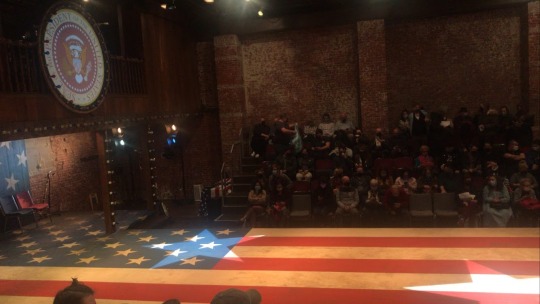
shot of the stage from our seats, by me.
There are constraints and oddities with the small stage and large cast, and many move to a sort of waiting-room area in the back of the stage when not needed, donning American flag facemasks. This is certainly a point where many audience members might feel the production misses on, as everyone present has been vaccinated, and every theatre-goer wears masks of their own. But Doyle’s production uses its unfortunate history with the pandemic to its advantage, masking and unmasking its heroes and villains, who stand in their period clothing like near reflections of the seated crowd. There’s an acknowledgment here, a oneness. After all, aren’t we all American? they seem to ask, aren’t we just like you?
Assassins is also difficult sometimes because of the breadth of characters and stories needed to be told, in a compact and mostly understandable way. As mentioned earlier, despite a truly amazing performance by Wesley Taylor, Guiseppe Zangara gets boiled down to a guy with a hurt stomach, and even after declaring he’s not “right” or “left,” the lack of clear motivations unfortunately muddles up the show quite a bit. The cast move fluidly through time and space, reality and fiction, and always reemerge after being put to death, or disappearing, or in Hyck’s case, making airplane arms and walking off-stage. The fates of these characters is sometimes unclear, but it makes the point that what happened after didn’t matter too much. Whether they did it for their country, or for love, or for what Booth encourages Oswald to seek- people to feel passionately about him- they did it.
Overall, I really enjoyed this performance. I had my fears returning to the theatre, viewing a show with a rocky past, and seeing my first Off-Broadway production. But with a score by Stephen Sondheim and book by John Weidman, a stage perfect for imaginative interpretation and an intimate experience, and a cast full of some of the most talented people in New York, this show was a delight. The acting was often funny, sometimes scary, and always engrossing. The singing was passionate and pointed (although debatable if loud enough, it was hard to tell if any of the leads were mic’d, or if not, projecting loud enough over the music), and the sheer closeness of the story to life and current events was both exhilarating and terrifying. It is hard to pinpoint any one performance because all of them were done fantastically and expertly, but my favorites were:
Every time Brandon Uranowitz was on stage. No, literally, he nearly stole the show with just how convincing he was. In every way, his physicality and movements, his troubled voice and accent, his glittering eyes, his scene with Bianca Horn as Emma Goldman, and The Gun Song, it was all so incredible, so above and beyond. Yes, I came into the show with a heavy Brandon Uranowitz bias, and firmly believe he is a modern day great, if not just for how good he was in the Falsettos revival, but really, it hurt to see his character walk off the stage each time he did. Truly so good.
Andy Grotelueschen as Samuel Byck, plotting to kill Nixon. He’s wearing a Santa suit which is delightfully and hysterically left unexplained (although the context/choice in this costume is kind of interesting). It becomes a one man show when he is on, he has a dry humor, and gets the audience laughing through his serious mutterings, holding his invisible steering wheel in a one handed-grip, driving his truck towards the airport to hijack a plane. The image of the plane flying, or rather the image that is created during that scene with his arms outstretched and the sound of a plane rumbling is one of the best of the whole show. Strangely beautiful.
The duet between Adam Chanler-Berat and Tavi Gevinson, who play John Hinkley Jr. and Lynette “Squeaky” Fromme respectively. It just sounds so beautiful and it's so strange and it works even though by all laws of time and space it shouldn’t work. Hinkley Jr’s got his guitar, staring lovingly and creepily at a press photo of Jodie Foster, and Fromme shows off a newspaper clipping of Charles Manson, in a ha! my love is real and your love is fake moment. It’s crazy and it's so entertaining because it just somehow works.
Lastly, Katrina Yaukey as my favorite multi-tasking ensemble player. Special shout-out. There’s a moment when she’s lying on her back with her limbs splayed out with some of the other instrumentalists for… reasons?? And she plays the most beautiful flute… I was a fan. Go team.
Everyone was great in this production, talented, funny, and it was truly electrifying being so close to the stage, and so close to so many accomplished actors. Not in a John Hinkley Jr wants to be close to Jodie Foster way. But CSC truly had such an exhilarating and welcoming environment. I left and I kept repeating “I cannot believe how small the theatre was,” and “I love how small it was.” Assassins may only have a small, limited run, in a small, off-Broadway theatre, but make no mistake. This show is huge. Don’t miss out on it.
★★★★☆
2 notes
·
View notes
Text
The Public Enemy Solidified Gang Rule Under James Cagney for 90 Years
https://ift.tt/3vfQifQ
William Wellman’s The Public Enemy (1931) turns 90 this weekend. When the film first came out, a theater in Times Square showed it nonstop, 24 hours a day, seven days a week. The movie marks the true beginning of gangster movies as a genre. Mervyn LeRoy’s Little Caesar may have hit theaters first, but The Public Enemy set the pattern, and James Cagney nailed the patter. Not just the street talk either; he also understood its machine gun delivery. His Tommy Powers is just a hoodlum, never a boss. He is a button man at best, even if he insisted his suits have six buttons.
The Public Enemy character wasn’t even as high up the ladder as Paul Sorvino’s caporegime Paul Cicero in Martin Scorsese’s Goodfellas. But Cagney secured the turf Edward G. Robinson’s Rico Bandello took a bullet to claim in Little Caesar, and for the rest of his career Cagney never let it go.
Some would argue genre films began in 1931. Besides mob movies, the year introduced the newspaper picture with Lewis Milestone’s The Front Page and John Cromwell’s Scandal Sheet; Universal Pictures began an unholy run of horror classics via Tod Browning’s Dracula and James Whale’s Frankenstein, with the two turning Bela Lugosi and Boris Karloff into household names; and Howard Hawks’ Scarface would land the knockout for the gangster genre, even if it didn’t get released until 1932.
Sadly, the classic “Gangster Film” run only lasted one production season, from 1930 to 1931, and less than 30 films were made during it. Archie Mayo’s The Doorway to Hell started the ball rolling in 1930, when it became a surprise box office hit. It stars Lew Ayres as the top mug, with Cagney as his sidekick. For fans of pre-Code Hollywood, it is highly recommended. It includes a kidnapping scene which results in the death of a kid on the street. Without a speck of blood or any onscreen evidence, it is cinematically shocking in its impact.
Both Little Caesar and The Public Enemy earned their street cred, defying the then-toothless 1930 Motion Picture Production Code, which preceded the Hays Code. After New York censors cut six scenes from The Public Enemy to clear it for release, the Motion Picture Producers and Distributors of America (MPPDA) set further guidelines for the proper cinematic depiction of crime.
Public Enemy director Wellman was an expert in multiple genres. He spit out biting satires like Nothing Sacred (1937) and Roxie Hart (1942), and captured gritty, dark realities in The Ox-Bow Incident (1943) and Story of G.I. Joe (1945). He won his only Oscar for A Star Is Born (1937). The Public Enemy is the first example of what would be his trademark: stylish cinematography and clever camera-work. The dark suspense he captures is completely different from the look of German expressionism. It captured the overcast shadows of urban reality and would influence the look of later noir films. His main character would inspire generations of actors.
“That’s just like you, Tom Powers. You’re the meanest boy in town.”
Orson Welles lauded James Cagney as “maybe the greatest actor who ever appeared in front of a camera.” Will Rogers said watching Cagney perform was “like a bunch of firecrackers going off all at once.” The New York City born performer explodes in this movie. Even in black and white, Cagney’s red hair flares through the air like sulfur on a match. It turns out to be a slow burn, which will reach its ultimate climax in 1949’s White Heat. The Public Enemy is loaded with top talent, but you can’t take your eyes off Cagney. Not even for a second. You might miss some tiny detail, like the flash of a grin, a wink, or a barely perceptible glare.
Cagney had a simple rule to acting: All you had to do was to look the other person straight in the eyes and say your lines. “But mean them.” In The Public Enemy, the characters communicate without lines. When Tom and Matt Doyle (Edward Woods) sneak a peek into Larry the Limp’s casket, we understand this is the first time the two young thugs lost someone their own age. The scene barely implies how fortunate they are not to be in that box, but their curiosity is as palpable as the loss of their last shred of innocence.
Cagney was originally cast as Matt, and scenes were shot with him in the role. The parts were switched mid-production, but they didn’t reshoot the flashback scenes, making it look like the pair swapped bodies between 1909 and 1915. It’s a shame because Frankie Darro, who plays the young Matt, made a career out of playing baby face Cagney, and later joined the East Side Kids franchise.
Former “Our Gang” actor Frank Coghlan Jr. took on the role of young Tom. He takes the lashes from his cop father’s belt, backtalking him the whole time. Tom Powers is reprehensible. He never says thank you and doesn’t shake hands. He delights in the violence and sadism. Powers doesn’t go into crime because of poverty; he just can’t be contained. Cagney’s mobster mangles, manhandles, maims and murders, and still needs more room in his inseam.
Dames, Molls, and Grapefruits
Besides defying the ban on romanticizing criminals, both The Public Enemy and Little Caesar broke sexual codes. There are explicit signs that Rico Bandello represses his sexuality in Caesar. Scenes between him and his friend Joe, and his gunman Otera, thinly veil homoerotic overtones. Public Enemy’s Powers, by contrast, subtly encourages the gay tailor who is openly hitting on him.
There are strong indications Putty Nose (Murray Kinnell) is grooming Tommy and Matt for more than just fenced goods. Look at the way Putty sticks his ass in Powers’ face while he is shooting pool. Putty Nose’s execution at the piano is creepily informed by the unspoken sins between the men. Tommy relishes the kill.
However, Tommy doesn’t relish being manhandled when he’s too drunk to notice. While the gang goes to the mattresses in the movie’s gang war, Tommy is raped by Jane (Mia Marvin), his boss Paddy’s girl. Powers protests the best he can, but the camera angles leave no doubt. Tommy wakes up hungover, horrified, and feeling impotent. Matt, however, has no trouble getting “busy” with his girlfriend Mamie, played by Joan Blondell, in one of the scenes trimmed by the censors. Blondell, Jean Harlow, and Mae Clarke, who plays Tommy’s girlfriend Kitty, represent a glitzy cross-section of white Roaring Twenties glamour. In the opening credits, when Harlow and Blondell smile at the camera, male audience members of the time blushed.
Harlow was Hollywood’s original “Blonde Bombshell,” starring in the movie that coined the term. Her earthy comic performances would make her a major star at MGM, but she was a dud to critics of The Public Enemy. Hers was the only part which was criticized, and the reviewers were brutal, declaring her voice untrained and her presence boring.
Harlow’s greatest asset had to be contained within the Pre-Code era. Straddled with a wordy part as a slumming society dame, she is directed to slow her lines to counter the quick patter of the rest of the cast. Yet Harlow uses that to her benefit in the film’s best moment of sexual innuendo. While telling Tommy about “the men I’ve known,” she pauses, and appears to be calculating them in her head before she says, “And I’ve known dozens of them.” When an evening alone with Tommy is cut short, Gwen’s exasperation over the coitus interruptus is palpable. Members of the Catholic Legion of Decency probably had to go to confession after viewing the film for slicing.
Most people know The Public Enemy for the famous grapefruit scene where Powers pushes a grapefruit into his girlfriend’s face. “I wish you was a wishing well,” he warns, “so that I could tie a bucket to you and sink ya.” Tommy treats women like property. They are status symbols, the same as clothes or cars. Kitty’s passive-aggressive hints at commitment get on Tom’s nerves. He can only express himself through violence. There are rumors Cagney, who would go on to rough up Virginia Mayo in White Heat and brutalize Doris Day in Love Me or Leave Me, didn’t warn Clarke he was going to use her face as a juicer. According to the autobiography Cagney by Cagney, Clarke’s ex-husband Lew Brice loved the scene so much he watched it a few times a day, timing his entrance into the theater to catch it and leave.
Both actors have said it was staged as a practical joke to see how the film crew would react. It wasn’t meant to make the final cut. Wellman told TCM he added it because he always wanted to do that to his wife. The writer reportedly wrote the scene as a kind of wish-fulfilling fantasy.
The screenplay was written by Harvey F. Thew. It was based on Beer and Blood by John Bright and Kubec Glasmon. The unpublished novel fleshed out press accounts of the bootlegging Northside gang leaders, Charles Dion “Deanie” O’Banion, Earl “Hymie” Weiss, and Louis “Two-Gun” Alterie. Cagney based his Tommy Powers character on O’Banion and Altiere. Edward Woods was doing his take on Weiss. The book reflected the headlines in the Chicago papers, which reported Weiss smashed an omelet into his girlfriend’s face.
Read more
Movies
Al Capone: 9 Actors Who Played the Original Scarface
By Tony Sokol
Movies
Key Largo, Lauren Bacall & The Definitive Post-War Film
By David Crow
The Trouble Squad
The Public Enemy borrowed from the day’s headlines in other ways too. Hymie Weiss was assassinated in October 1926. It was the first reported “machine-gun nest” murder. It is recreated in the killing of Matt Doyle. While shooting the sequence, Cagney ducked real machine gun fire to bring authenticity to the scene. Also taken from real life is the fact that after O’Banion was killed in ‘24, Alterie’s first reaction was to do public battle with the killers. This is similar to Tommy’s final shootout at Schemer Burns’ nightclub headquarters.
Leslie Fenton’s dashing mob captain Nails Nathan (“born Samuel”) flashes the greatest grin in mob movie history. He is based on Samuel “Nails” Morton, a member of O’Banion’s mob. Both “Nails” were driven to their coffins the way it is depicted in The Public Enemy. The real Morton died in a riding accident in 1923, and “Two-Gun” Alterie and some of the other gang members went back to the stables, rented the horse which kicked Nails in the head, and shot the animal. Mario Puzo may have been inspired by this scene when he wrote The Godfather. It is not only tie to the Francis Ford Coppola movie. Oranges have as much vitamin C as grapefruits. Another similarity between the two films is the threat of being kidnapped from the hospital by a rival gang.
The Powers brothers’ relationship vaguely echoes the one between war hero Michael and Sonny Corleone, who believes, as his father does, soldiers were “saps” to risk their lives for strangers. Donald Cook, who played Mike Powers, didn’t pull any punches on the set. In the scene where he knocks Tom into the table before going off to war, he really connects. Wellman told Cook to do it without warning so he could get that look of surprise. Cook broke one of Cagney’s teeth, but Cagney stayed in character and finished the scene.
“It is a wicked business.”
After the stock market crash, get-rich-quick schemes seemed the only way through the Great Depression. The gangster was an acceptable headline hero during Prohibition because the law was unpopular with the press. But after 1929, the gangster became the scapegoat villain. The Public Enemy was the ninth highest grossing film of 1931. But the genre lost its appeal after April of that year, as studios pumped out pale imitations and audiences got tired of the saturation, according to the book Violence and American Cinema, edited by J. David Slocum. Religious and civic groups accused Hollywood of romanticizing crime and glamorizing gangsters.
The Public Enemy opens with a dire warning: Don’t be a gangster. Hoodlums and terrorists of the underworld should not be glamorized. The only MPAA rule the film didn’t break was portraying an alliance between organized crime and politics. The studios passed the films off as cautionary tales which were meant to deflate the gangster’s appeal by ridiculing their false heroism.
Through this hand-wringing, however, Cagney turns false heroics on its head with the comic brilliance of a Mack Sennett short. Stuck without a gun, he robs a gun store armed with nothing but moxie. Powers never rises in the organization. He takes orders and whatever the boss says is a good cut, only asking for more money once from Putty Nose. Unlike Rico, who rose to be boss among bosses, Powers has no power to lose. This is just the first gig he landed since he was a regular “ding ding” driving a streetcar, and it connected with audiences like a sock on the button. They identified with the scrappy killer, and it surprised them.
Even Gwen notices Tommy is “very different, and it isn’t only a difference in manner and outward appearances. It’s a difference in basic character.” Strict Freudians might lay this on his mother (Beryl Mercer), the greatest enabler Cagney will see until White Heat. Ma Powers’ little boy is a budding psychopath knocking off half the North Side, but look at the head on his beer. For audiences at the time, Tom was the smiling, fresh-scrubbed face of evil. He is consistently unsympathetic but likable from the moment he hits the opening credits.
Like Malcom McDowell’s Alex in A Clockwork Orange, he is the fiend’s best friend. Even if it is Tommy’s fault his best pal Matt gets killed. While Cagney spent his career ducking his “you dirty, double-crossing, rat” line from Taxi, the actor wasn’t afraid to play one in Powers. He’s not a rat in the sense he’d snitch on anyone. He’s the last of the pack who sticks it out for his pals when his back is up against the wall.
A Hail of Bullets
Tommy Powers goes by this credo: live fast, die young, and leave a corpse so riddled with bullets, not even his mother can look at his body when he’s done. But then, no one can end a film like Cagney. He’s danced down the White House stairs in Yankee Doodle Dandy (1942), been rolled across the concrete steps of a city church in The Roaring Twenties (1939), and was blown to kingdom come in White Heat. He gets two death scenes in The Public Enemy, a rain-soaked climax, and a denouement as scary as The Mummy. Tommy only brings one gun to the gang fight, and by the time he hits the pavement, he’s got more holes in him than the city sewage system.
“I ain’t so tough,” Tommy says on his final roll into the gutter. Cagney’s first professional job was in a musical drag act on the Vaudeville circuit, and he called himself a “song and dance man” long after retirement. For The Public Enemy, conductor David Mendoza led the Vitaphone Orchestra through such period hits as “Toot Toot Tootsie (Goodbye),” “Smiles,” and “I Surrender Dear.” But the song “I’m Forever Blowing Bubbles” is the one which lingers in the memory. Martin Scorsese has cited it as a reason his films are so filled with recognizable music.
Street violence comes with a natural soundtrack. Transistor radios accompany takedowns. Boom boxes blast during shakedowns. Car stereos boost the bass during drive-by shootings. In The Gang That Couldn’t Shoot Straight, mobsters feed quarters into a jukebox to cover up sounds of a beating.
In The Godfather, Part II, a street band plays traditional Italian songs while Vito Corleone puts bullets in the neighborhood Black Hand, Don Fanucci. The last thing we hear in the abrupt close to the mob series The Sopranos is a Journey song. The first thing Tommy’s mother does when she hears her boy is coming home from the hospital is drop a needle on a record.
The ending leaves us with two questions: Who killed Tommy, and what’s his brother going to do about it? We figure whoever did the job on Powers was probably a low-level button man from Schemer’s rival outfit. Probably even lower down the ladder than Tommy, and on his way up, until another Tommy comes along. Crime only pays in the movies, Edward G. Robinson often joked.
Mike’s reaction to the bandaged corpse is ambiguous. He’s already shown outward signs of the trauma following the horrors of war. Is he clenching his fists in anguish or anger? Is he broken by the battlefield or marching off in vengeance, a soldier on one last duty? Cook’s exit can go either way.
After 90 years, The Public Enemy is still fresh. It’s aged better than Little Caesar or Scarface. Cagney wouldn’t play a gangster again until 1938, but the image is etched so deeply in the persona, audiences forget the vagaries of villainy Hollywood could spin, and the range of characters Cagney could play. He and the film continue to influence filmmakers, inform culture, and surprise audiences. Tommy Powers was just a mug, but those streets are still his.
cnx.cmd.push(function() { cnx({ playerId: "106e33c0-3911-473c-b599-b1426db57530", }).render("0270c398a82f44f49c23c16122516796"); });
The post The Public Enemy Solidified Gang Rule Under James Cagney for 90 Years appeared first on Den of Geek.
from Den of Geek https://ift.tt/3xnjfs7
1 note
·
View note
Text
Character Sheet: Kirollis

The Basics ––– –
Name: Kirollis C. Duskhaven
Nickname(s): Kiro, Dad, Sparky, Nuisance
Age: 199
Birthday: Late August
Race: Sin’dorei (Blood Elf)
Gender: Male
Marital Status: Widowed, divorced, single
Physical Appearance ––– –
Hair: Ochre brown
Eyes: Emerald
Height: 6’1
Build: Athletic, muscular, lean
Distinguishing Marks: Old scarring across his neck, jaw, and above his eyebrow
Tattoos: One on his pectoral, and one on his bicep. Both of runic origin and have magical function.
Piercings: N/A, not worn
Common Accessories: Bandana’s, scarves, balkalvas, a charm bracelet (hidden), weaponry, sometimes hats
Personal Information––– –
Profession: Father, spy, scoundrel, small business owner
Hobbies: Reading, exercise/training, sketching, free running, recreational target recon, making bad jokes, string instruments, tinkering
Languages: Thalassian, Darnassian, Common, Orcish, Gutterspeak, Dwarvish, Goblin
Residence: Silvermoon City
Birthplace: The Blackened Woods (Ghostlands)
Religion: Agnostic
Patron Deity: Lady Luck
Fears: Losing his daughter, becoming his parents
Relationships ––– -
Spouse: Nelah (Deceased, Leholana (Divorced)
Children: Soriya ( @simplysoriya )
Parents: Raylor Duskhaven (Father, deceased), Parphilia Duskhaven (Mother, Deaceased)
Siblings: Jix Duskhaven (Older brother, MIA), Varalie Duskhaven (Younger sister), Soldonis Duskhaven (Younger brother, deceased)
Other Relatives: Undisclosed
Pets: None current
Sex & Romance ––– -
Sexual Orientation: Hetero
Preferred Emotional Role: submissive | dominant | switch
Preferred Sexual Role: submissive | dominant | switch
Libido: Low to moderate
Turn ons: Exotic features, confidence, disinterest
Turn offs: Diminutive, no sense of humor, freckles
Love Language: Caring, nurturing, private, faux teasing
Relationship Tendencies: Slow and steady, commitment issues, revealing layers
Traits ––– -
* Bold your character’s answer.
Extroverted / In Between / Introverted
Disorganized / In Between / Organized
Close Minded / In Between / Open Minded
Calm / In Between / Anxious
Disagreeable / In Between / Agreeable
Cautious / In Between / Reckless
Patient / In Between / Impatient
Outspoken / In Between / Reserved
Leader / In Between / Follower
Empathetic / In Between / Apathetic
Optimistic / In Between / Pessimistic
Traditional / In Between / Modern
Hard-working / In Between / Lazy
Cultured / In Between / Uncultured
Loyal / In Between / Disloyal
Faithful / In Between / Unfaithful
Additional information ––– –
Smoking Habit: Some herbs on occasion
Drugs: Thistle frequently
Alcohol: A social drinker most of the time

RP Hooks ––– –
Rogue: Assassin/Criminal/Spy Background: That’s right, he's a triple threat. Whether it be his past as an assassin for high class clientele coming back to haunt him. Finding his way as a criminal in the aftermath of the Scourge when gang crime was prominent and the less than savory cast of characters he dealt with, as well as enemies made. Becoming a renowned smuggler on the Eastern Kingdoms, moving all sorts of cargo, even from surprising sources, that he still dabbles in. Or the more current military background he possesses as a spy for Quel’thalas? He has a wide berth and several angles to come at as far as his extensive background in some of the more roguelike corners of the fantasy world and it’s pretty open as far as his contacts in it.
Mentor/Rival: As stated above, Kirollis has been in the game for quite some time. Amassing quite a network of talented folks, resources, and methodology in his storied history. It’s not uncommon for him to give tips to others like him who are just starting out. However he can be pretty fickle when it comes to try hards.There have been quite a few times friction and his particular prickly personality can lead to more of a rivalry, as younger generations in the game look to make their bones on a fairly juicy target.
Trouble: Sometimes trouble just follows him around. Whether he caused it or not is an entirely different question. By nature he’s a bit of a trickster, and enjoys taking people for a ride whether that be verbally or physically. This, of course, leads to a lot of situations that can be less than ideal. Though every now and again his shenanigans can run indirectly, for example; bar fights have happened quite a bit. To be fair, though, he doesn’t always cause it. Sometimes he’s just as much a victim of shitty situations as the next person, whether that be a zeppelin hijacking or an Old God infestation, trouble (Ranging from serious to silly) tends to follow him.
{Art creds: Zoratrix }
90 notes
·
View notes
Photo

The Curse of the Pharaohs (Assassin's Cred Origins/ DLC ) by Eddie Bennun https://www.artstation.com/artwork/E6B5N
3 notes
·
View notes
Text
221. Sonic the Hedgehog #153

Oh god, is Sonic, like… okay? Is he all right up there? What horrific manner of trouble did he get himself into this time to have his face become deformed like that? Also, I like how this cover implies that Sonic is being hunted down by someone shooting lasers or something, when literally nothing even close to the sort happens within the issue. I know it's perhaps getting a bit stale to point out every time the cover art doesn't reflect the stories inside, but dammit, it makes me laugh so I'm gonna keep doing it.
Songoose (Part 1 of 2)
Writer: Karl Bollers
Pencils: Ron Lim
Colors: Jason Jensen
Eggman has a new agenda to enact. He's offered Nack the Weasel a large sum of money in exchange for assassinating someone very important within Knothole, and despite Nack's apparent reservations about waltzing into a place where he's wanted for quite a few crimes, he seems pretty jazzed to accept the offer nonetheless. Within Knothole, Sally has arranged a mock battle training exercise between the Freedom Fighters and the Chaotix to strengthen team bonding and combat skills, and oversees the training along with General D'Coolette, discussing the various combatants' strengths and weaknesses.
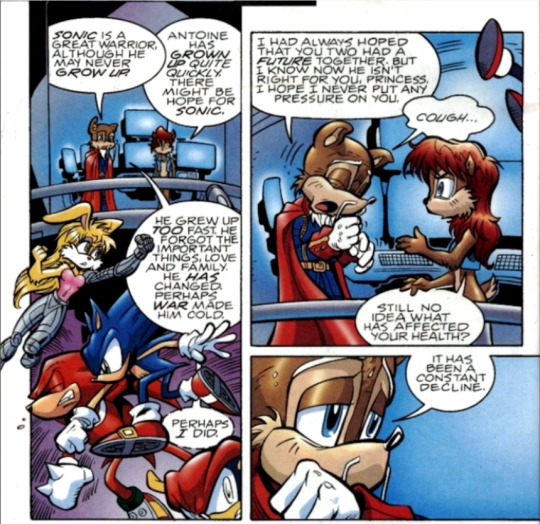
Uh oh, that doesn't sound good. In fact, at that moment they get a call from the king and queen, still halfway around the world, and apparently the king is also exhibiting similar symptoms to the general, prompting Sally to muse on whether their illnesses are related. She wonders if they should cut their trip short and return home, something which the king is against but the queen tentatively supports, but the conversation is interrupted when suddenly, the general seizes up and then collapses onto the ground. That's… probably not a good sign. Worse still, "Antoine" doesn't even seem to care, though of course we know why.
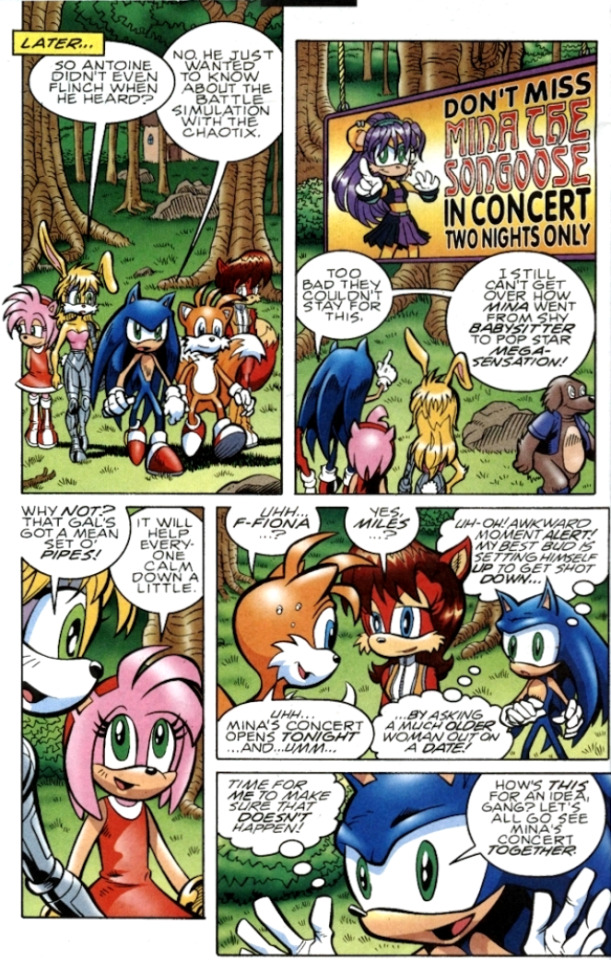
So this is actually a plot point that's kept up throughout a lot of subsequent issues - apparently, Tails' crush on Fiona is still going strong, despite the fact that he literally "fell in love" with a robot duplicate of her which had nothing in common with the real her. It's honestly a very weird detail to seize upon, as while Fiona being a real person and a unique character in her own right is interesting, and the fact that she's joined the Freedom Fighters even more so, Tails trying to like… flirt with her and become her boyfriend is just a bizarre place to take it, especially considering the age difference. I mean, don't get me wrong, I know it's not uncommon for a kid to end up with a crush on an older teenager, but multiple writers from here on out write Tails as being actually infatuated with her and unable to "let her go" after her robot duplicate broke his heart. It just doesn't feel like Tails to me and it's frustrating, to say the least. But anyway, moving on, everyone agrees it's a good idea to go to Mina's concert tonight and disperse. Sonic catches up to Fiona and tries to explain that Tails looks up to her, but she just makes a snarky comment about Sonic being one to talk about respect given how he acted the other day towards her - yeah, apparently he still hasn't told everyone that it was his evil double flirting with all the girls. Also, we never actually saw Evil Sonic come on to Fiona before, but I guess it just happened offscreen. She then admits to him that she hated him for a long time for leaving her behind in Robotnik's prison camp all those years ago, but changed her mind after seeing him sacrifice himself for the planet during the Xorda invasion, making her realize that he never left her behind on purpose. Aww, that's actually nice! Fiona has the potential to be a really interesting and complex character, and, well, honestly she's one of my favorites of the later comics, so I'm glad to see her getting more screentime.
That night, Sonic and the others show up backstage at the venue to give Mina a friendly pep talk before her show. She hugs Sonic, thanking him for the encouragement, and Ash immediately becomes very jealous and butts in to remind everyone that he's Mina's boyfriend and band manager and that she needs to go to the stage now, prompting a clueless Sonic to wonder what his problem is. However, Mina's performance actually kind of reveals that Ash has a good reason to be suspicious of her interactions with Sonic, as the sappy, lovey-dovey lyrics of her songs all reference the color blue in various ways, and are clearly influenced by her previous infatuation with Sonic. But things aren't as happy and peaceful as they seem, as a suspicious figure lurks in the crowd…
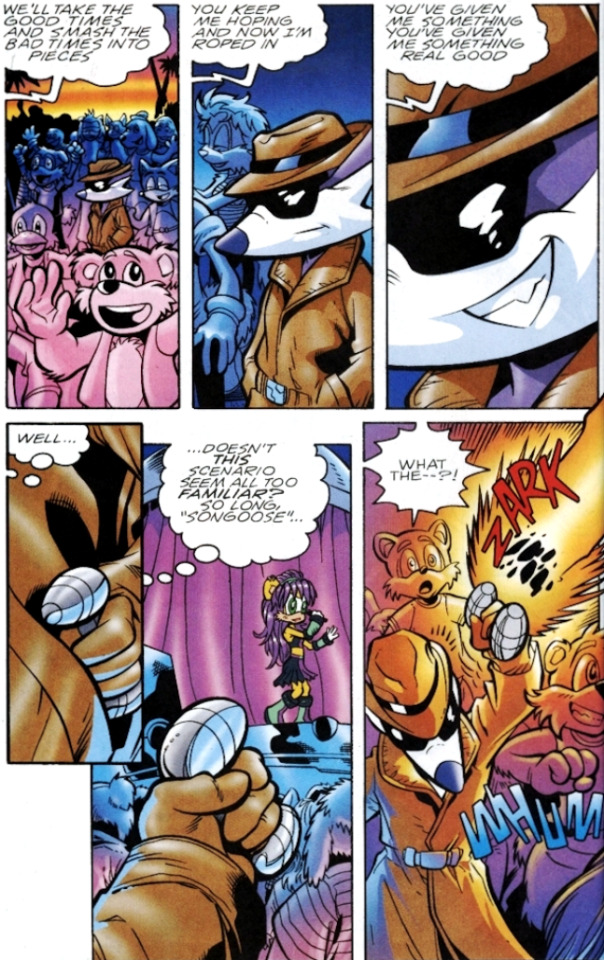
So Mina was Eggman's target, huh? Strangely enough, Nack, with a totally clear shot to the stage, misses and hits a tree several feet above and to the side of Mina. Like, it's not even played off as "oh, he was trying to make the tree fall on her, or someone bumped his elbow" or something - he just straight up misses for no reason, sets the tree on fire with the blast, and then tries to make a run for it. Some assassin you are, especially considering your alternate name is Fang the Sniper! Sonic, Bunnie, and Ash immediately race onstage to check on the startled but unharmed Mina, and Bunnie focuses on putting the fire out while Sonic races after Nack, catching and knocking him out easily. Nack wakes up hours later in Knothole's jail, where Sally and Sonic attempts to question him on his motives, and he decides to be all flippant and act like it's no big deal that he was caught, as he'd rather spend some time in prison than ruin his "cred" by giving up the name of his employer. I'm sorry, Nack, but what freaking cred are you even talking about? Like what, are you gonna go around telling prospective employers that your skill set includes missing a target forty feet away, setting a random tree on fire, and then immediately getting arrested? Sally merely points to the cell across from him, where he's quite perturbed to see the three other weasel associates who helped him kidnap her a year ago, and she invites him to go ahead and spend his time in jail sharing space with them after he knowingly left them to take the fall for his failed plan. Of course, he spills the beans on Eggman immediately.
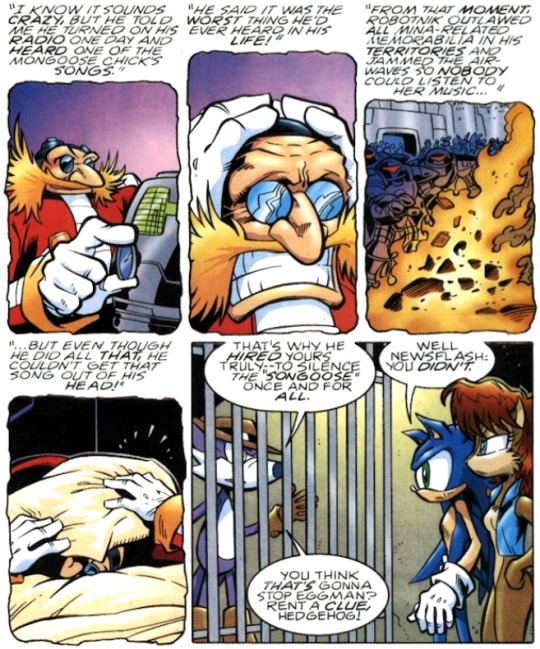
Well… I suppose that's not even out of character for Eggman, considering his original counterpart also hated music. Sally decides to assign Sonic as Mina's personal bodyguard for now, while the other Freedom Fighters keep an eye out at the next night's concert to make sure nothing comes near Mina. Ash isn't pleased at all with Sonic being close to his girl, and stomps off, with a bemused Sonic commenting to Mina that he's pretty sure her boyfriend doesn't like him. Gee, what gave you that idea, Sonic? Sally's caution is warranted, however, as back in New Megaopolis we see Eggman preparing his next plan of attack in the wake of Nack's abysmal failure - he's rebuilt Heavy and Bomb, and is ready to sic them on Mina! Man, it's been a while since we saw those guys, huh? Now that I think about it, after they got reprogrammed by Eggman before, Sonic just kind of straight up killed them when they tried to attack the royal family, and no one seemed upset about it at all. Well, maybe with them back, they'll get a chance to be freed and find redemption… or maybe the writers still don't care and they'll get fridged again. Guess we just gotta wait and see!
Fairy Tale (or the Adventures of Pirate Sally)
Writer: Romy Chacon
Pencils: Art Mawhinney
Colors: Josh Ray
Wow, it's been quite some time since we last had a "telling a bedtime story based on real events in the storyline to kids" episode, huh? Apparently, Rosie's three young charges have caught a bad cold, and as she brings them medicine to try to help them sleep they all start begging for her to tell them a story. She's reluctant, claiming she's not good at stories, but relents when they persist in asking. She invents a magical world of pirates and wizards, where the "Elfen Fox" falls onto "Pirate Sally" and "B-Bot's" ship, having had one of his two magical tails stolen by the "Rogue Assassin," who doesn't really live up to her name if all she's doing is going around stealing things. Man, what is it with wildly ineffective assassins this issue? Pirate Sally and B-Bot decide to help out the fox, and along the way meet their new allies Ant the Foole and the Blue Knight, who help them defeat various baddies based on the main villains of the comic's storyline. Finally, they make it to the Evil Wizard Kintobor's lair, whom they fight against as a team and help the Elfen Fox take back his missing tail.
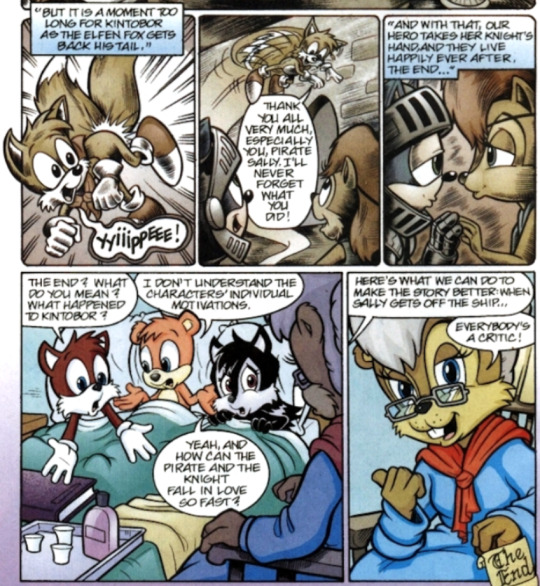
I actually love this story, entirely because of the way the kids just start roasting Rosie's storytelling skills as soon as the whole thing is over. Hey, look on the bright side Rosie - now that they're preoccupied with coming up with a way to fix your terrible story, they won't be pestering you for more anytime soon!
#nala reads archie sonic preboot#archie sonic#archie sonic preboot#sonic the hedgehog#sth 153#writer: karl bollers#writer: romy chacon#pencils: ron lim#pencils: art mawhinney#colors: jason jensen#colors: joshua d ray
4 notes
·
View notes
Text
The Rush Fish-Eye Lens: The Virtue of Selfishness

There's a time for feeling as good as we can
The time is now, and there's no stopping us
There's a time for living as high as we can
Behind us you will only see our dust
So we'll just keep smiling, move onward ev'ry day
Try to keep our thoughts away from home
We're travelling all around, no time to settle down
Satisfy our wanderlust to roam…
from Making Memories (1974)
When Neil Peart penned these lyrics as a young man in his early 20s, he was roaming around the United States in a new music ensemble from Toronto. He was hastily hired into this group who had only two weeks to replace their original drummer before embarking on their first American tour. His drum audition for this group, RUSH, sufficiently impressed original members Geddy Lee and Alex Lifeson musically, although they were concerned that his appearance did not entirely suit the “Rock” image. What longtime friends Lee and Lifeson would soon learn about “the new guy” as they all became close was that his predilection for reading and word craftsmanship would provide meaningful direction for their songwriting.

Only ten years prior to this union of Canadian artists, the Russian-American writer Ayn Rand published a set of essays called The Virtue of Selfishness codifying foundations for her philosophical system, Objectivism. Her validation of egoism and assertions exposing altruism as a destructive practice also reflected the modus operandi of that era’s youth, the postwar Boomer generation. In the year of Rand’s publication immediately following the assassination of President John F. Kennedy, the first wave of Boomers began entering higher education armed with numerous loud voices demanding the freedom to express their individuality. This cohort who were the recipients of Dr. Spock permissiveness collectively escaped their suburban conformism and established the era of self-fulfillment that journalist Tom Wolfe in 1976 coined as the “ME Decade.”

Prior to joining RUSH, Peart discovered Rand’s novels while pursuing a music career in England. Unable to establish networking momentum, he began filling the unproductive time avidly reading. While working at The Great Frog on Carnaby Street selling trinkets and jewelry, he immersed himself in the world of Rand’s Fountainhead, Atlas Shrugged, and Anthem, and developed a perspective that would inform the lyrics set to music by Lee and Lifeson. He worked only a short distance away from Charing Cross Road where was located Better Books, the London bookstore that fostered the counterculture scene by future RUSH critic Barry Miles. Peart’s failed English springboard disillusioned him and he returned back to his native St. Catherines, Ontario to work for his father’s tractor parts business.
undefined
youtube
RUSH with Peart as drummer, lyricist, album cover supervisor, tour book director (among other tasks), forged a longevity formula remaining together through the turbulence of the ever-changing industry and their personal lives. With the benefit of hindsight, their initial collaboration can be understood as establishing a process oriented towards achieving the highest possible standards. At the time though in 1974, their first serious tour together supporting groups such as Uriah Heep and Manfred Mann’s Earth Band provided them with their first opportunity to collaborate on material for their first album together.

From the very first composed syllable, RUSH established their Randian cred. Just as Rand defected from the communism of Soviet Russia in 1926, Fly By Night voiced thematically a desire to escape “begging hands and bleeding hearts” and to “write songs for themselves.” A paean to the ME decade, their ideas epitomized the zeitgeist of self-absorption. The 1970s witnessed a culture preoccupied with health food, hot tubs, physical exercise, Kung Fu, therapy, Helter Skelter cults, and fervent Environmental activism akin to religiosity. Simultaneously, the Religious Right was ascendant and the Southern Strategy was underway. RUSH’s following was built atop this foundation, and remains faithfully committed to the ideals that their artistic collaboration expressed.
undefined
youtube
Recorded in ten days in Toronto, their first album together, Fly By Night, was released 45 years ago. The themes they explored expressing the desire to embark on the “Hero’s Journey” updated Aristotelian thought: that each man’s life has a purpose and that the function of one’s life is to attain that purpose. This purpose can be achieved via reason and the acquisition of virtue. Each human being should use his abilities to their fullest potential and should obtain happiness and enjoyment through the exercise of his realized capacities (individualism). For this, they were awarded Juno Award for Most Promising New Group. Nearly 40 years later, their rich body of work was validated by induction into the Rock Hall of Fame. Their anthems will continue to resonate for they have created together a profound body of work inviting deep exploration and giving us a better understanding of this next period of Awakening.
undefined
youtube
#rush band#geddy lee#alex lifeson#neil peart#Ayn Rand#Objectvism#Fly By Night#Anthem#Nathan Santos#me decade#Tom Wolfe#awakening#aristotle
9 notes
·
View notes
Photo
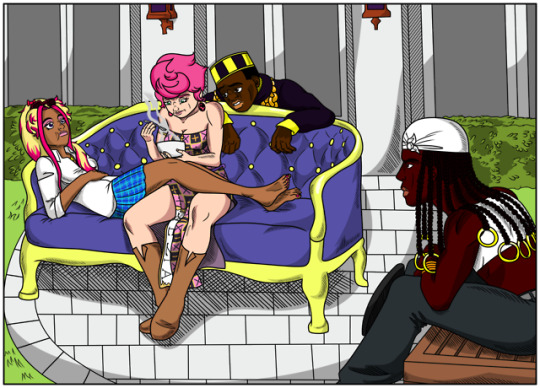
BEVERLY HILLS.
“Say aah,” Trish says, holding a gilded spoon, full of soup.
“Aaah--,” Shizuka replies, opening her mouth, allowing Trish to feed her. She closes her mouth and swallows the soup, then looks out at the beautiful, lush garden around her. Her eyes and mouth are the only parts of her body that are moving. The rest of her lies motionless on an outdoor sofa, propped up on soft cushions on the veranda of the C-King mansion.
“Is it good?” Trish asks, sweetly.
“Mm, it’s good!”
There is a sudden screech of tires, and they both look over at Jerome sitting a short distance away. In his hands is a remote controller, not unlike the device used by Ricardo Cone to control his drone. But this device is not controlling a drone. The vehicle it is controlling pulls up a few feet away from them, coming to a smooth stop in the gravel courtyard. It’s a real car: a real, life-sized car of Italian make, with a gasoline engine and controlled via a tall, electronic antenna. “What you think?” Jerome calls out. “Pretty cool, right?”
The passenger door opens and Kilo steps out of it. “That is really dangerous.”
Jerome grins. “Yeah? And…?”
“... And it’s cool.” Kilo concedes and moves towards them, his feet crunching on the gravel. “Are you still paralyzed?” he exclaims, gesturing at Shizuka, “It’s been three days already, how long she gonna be stuck like this?”
“There’s no way to know,” Trish replies, “Stand abilities will always surprise you, no matter how many you face.”
“I can move a little bit already!” Shizuka claims, “I can lift my arms a bit, and wiggle my toes and everything! I just hope I get full mobility back soon. Aaaah-- Mm… I can’t find my mom stuck to a couch. Ugh, I’d hate to have to call Josuke-bro to come fix me…!”
“Josuke?” Kilo asks, sitting on the lawn chair next to the sofa.
“Mm, my brother. Aaaah-- He’s a Stand user too, he’s able to heal any injury by bringing you back to an earlier state.”
“... You don’t think a guy like that would be useful to have brought along?”
“Well, you know, I wanted to--”
“Open,” says Trish.
“O-Aaaah…”
While she eats, Trish butts in. “I’m sure you have your reasons for wanting to do things by yourself. And anyway, I’m sure we won’t have to bother your brother. With the progress you’re making, you should be right as rain within just a few days.”
“Mmm! Did you mean it when you said you’d stay with me until I get better?”
“Of course! It’s the least I can do.”
“Well, ain’t that touching,” Jerome says, lumbering towards the couch. He sits down on the couch just behind Trish and stares at her. She, in response, looks away shiftily. “I suppose doin’ that good deed makes up for how y’all ditched me back at the show, huh? After all that shit ‘bout keepin’ you waitin’? Oh, it makes it alllll better. Forget about the months o’ marketin’ and keepin’ shit under wraps, oh naaah, it’s allllllll good!”
“... One of my fans got kidnapped by a Stand! What was I supposed to do?”
“Do you know what my managers said after you pulled that shit?!!”
“You all seem in high spirits,” says a new voice.
The four of them jump in their seats before turning to look behind them to the voice. Shizuka gasps. Kilo gets up immediately.. “Moya!” Shizuka cries.
Moya Pezzente steps out from the house, onto the veranda where Shizuka and her friends are gathered. “And who the fuck IS THIS!?” Jerome storms, “Who you think you are comin’ into my house!?!”
“Keep back, Jerome,” Kilo growls, “She’s no thug. She’s like us.” He and Trish bring out their Stands. Moya follows suit.
“Waitwaitwaitwait don’t!” Shizuka cries, shaking her head. “She’s not here to fight! …You’re not right?”
“No, I’m not.”
“See? She just wants to talk! … Right?”
Moya chuckles. “You know, somehow I knew you wouldn’t leave. Nice to see that worked out well for you.”
“I don’t trust you,” Kilo says bluntly. SATURN BARZ glares at her from over his shoulder and snarls.
“Well, that’s too bad,” Moya replies, “Guess I can’t blame you. Would it help if I told you I helped protect y’all after your haphazard bullshit nearly got you killed…? No, I guess it wouldn’t. If you can’t trust me, why not trust her?” She points to Shizuka, who looks at Kilo pleadingly.
For a moment, he thinks. “... Put yo Stand away. Then, you can talk.”
Moya raises her hands, and WITCH MOUNTAIN disappears. In tense silence, she comes around the couches to stand in front of them directly. “I came to warn you. You’re not just dealing with a bunch of thugs.”
“You came to talk,” Kilo says, putting his own Stand away, “so talk.”
Moya takes a deep breath, as if she’s ready to unburden herself. “The organisation I work undercover for is called the Congregation,” she declares, sparing little time. “It’s wrong to think of them like an ordinary gang, it’s more of a corporation, formed by the union of three individual gangs, working as equals. They don’t appear in the news, they don’t tag graffiti on walls or freeways. They don’t have to. The entire city is their territory. They’ve made subordinates of almost every street gang in town, and maintains a general status quo of petty crime and bloodshed to cover up their own activities.
“La Phantasmagoria, the gang I’m under, is the drug wing, based in East LA. We move heroin, coke, meth and whatever else from south of the border, then pass it on to our subordinate gangs while taking a cut of the profits. That’s how we make the majority of our funds. Most of the sub gangs used to be independent outfits that made their own product, but under the Congregation, that’s forbidden. We only peddle. Some go-getters still try, of course. But that’s where the Daesang come in.”
“Assassins. The organisation’s execution squad,” Trish says
Moya nods, confirming her suspicion. “If they get contracted by one of our clients, or the organisation itself need somebody dead, then the Daesang are the ones to pull it off. They’re all Koreans, and they have a hold of Koreatown and most of central LA. Their leader is named All-Kill, and they’re some of the most dangerous people I’ve ever met… Including your mom, Shizuka.”
Shizuka swallows, but doesn’t interrupt. Jerome does. “Maaaaaan, what the hell you gone and dragged me into, Kilo?”
“Jerome. Not now.” Kilo says.
Moya continues, “Brother Dust is responsible for bringing these people together, him and his gang, the original Congregation, operating out of Compton. He’s the man with the master plan, and his people deal in secrets. When a celebrity gets drunk and totals a new car, or a local politician ends up killing a prostitute, they turn to Dust. He cleans up the mess, and in return, he places them firmly in his pocket. Almost everyone in the LA underworld owe him something, and none of them would ever dare roll on him.”
“Why are you telling us this?” Kilo demands.
“Because you, all of you, are on their radar now. Your recklessness has borne fruit that I can’t get you out of anymore. They’re coming for you. Maybe tomorrow, maybe next week… maybe today.”
“We can take ‘em, whoever they are,” Kilo asserts.
“Like you took him last time?”
Kilo’s freezes, his eyes go wide. “... What did you say?”
“If the Congregation is after you, then he’ll be the first in line. He lost a lot of cred during that fiasco in Compton. He’ll be eager to make it right, first by killing you, then by--” Then she stops talking because Kilo storms towards her and grips her shoulder hard.
“Tarantula?!” he shouts, his blood boiling, “Where is he?! WHERE IS TARANTULA?!”
“Kilo, don’t!” Shizuka cries.
“On his way!” Moya shouts back, pushing Kilo off of her, “You have, at best, another day before he finds you. When he does, he’ll bring the full force of the Congregation on you. And some of these guys, I don't even know what they can do! It seems impossible for me to comprehend it!! All I know is they’re never going to stop! This has officially stopped being a game, you understand?! You need to pull your shit together, or else--!”
“Or else what, Hermana?”
#jjba#jojo's bizarre adventure#Jojo no Kimyou na Bouken#achtung attitude#shizuka joestar#kilo staples#trish una#C-King#ch18
6 notes
·
View notes
Text
Bernstein’s Postmodern Mess

Last weekend, we attended a performance of Leonard Bernstein’s Mass at the ravine Festival, conducted by Bernstein-protegé Marin Alsop. I have vivid recollections of this work from when it was brand new in the early 1970s, and I bought the Columbia recording of that first performance. I recall struggling with the work, both as a lapsed Catholic, and as an evolving composer. Revisiting the work, after so many years, brought home the things that I had admired about it originally, and the things I had thought kinda sucked.

My complicated response to the piece parallels the works own excessive ambitions. Lenny had been asked to write a work for the opening of the Kennedy Center, and he had been very devastated by the assassination of JFK, as his “Kaddish” Symphony indicated. That work had already struggled with a mixture of different musical styles, and how they might be reconciled in a single work. Mind you, in retrospect, Postmodern music was burgeoning into life in the late 1960s, and it’s become a kind of musical parlor game to redefine Bernstein’s “problematic” eclecticism as successful postmodernism. I’m inclined to give him those creds: he was trying to achieve in his work a mixture of “high and low” styles that is consistent with postmodern composition. So Bernstein’s desire to mix classical music elements with an idiom more in keeping with Broadway does not offend me in principal. The question really is: can you make it work?
Lenny has also been criticized for creating works that “borrow” from other composers. This goes back to the start of his career, when his Hindemith Meets Copland style owed a clear debt to other composers. Bernstein was also very aware that Stravinsky had been adept at this kind of pilfering. Listen to Bernstein analyze Stravinsky’s Oedipus Rex, for example, and draw out the references to Verdi, Handel, Bizet, Mozart, etc. that litter the score. But to my ear, Bernstein’s Mass owes its major debt to one other work: Benjamin Britten’s War Requiem. That work mixed the Latin Mass for the Dead with poems by Wilfred Owen, using opposing forces (chorus versus soloists, full orchestra against chamber orchestra, etc.) to separate the opposing ideologies, until everything collapses in a soaring “lullaby” to the words “let us sleep now.”
Bernstein’s Mass has a notably similar construct: the traditional choir contrasts with a group of “street singers” who represent contemporary ideas. Trying to convey the conflict between faith and contemporary doubt about orthodoxy, Lenny and his librettist Stephen Schwartz (who wrote Godspell) did their best to sort out these conflicts, following a method strikingly similar to Britten in the War Requiem. So how is it that Britten’s work manages to be a tightly unified and emotionally overwhelming work, and Bernstein’s is such a hodgepodge?
I don’t think it’s just the juxtapositions of style, or the jolts of being in a dissonant modernist vocabulary one moment and something that sounds like West Side Story the next. I really think, if Lenny could have found himself a Catholic Stephen Sondheim to provide him with a libretto, they might have pulled it off. Instead we have conflict without real resolution, or rather, the solution is “faith is its own answer.” If you are struggling to believe, you have to give in and believe, and then the crisis goes away. That seems to be the summary of what goes on here. The problem is, there’s too much unresolved struggle. When the “Celebrant” has a kind of nervous breakdown near the end of the piece, the doubting “street singers” hurriedly put thing back in place, and they bring in the “kids” - showing him that children still have their faith, and suddenly, everything is all better. It just doesn’t work. It isn’t dramatically successful or philosophically acceptable. Too much has been taken apart during the course of the work for the concluding hymn of praise to feel genuine. “If you can’t truly believe, then fake it” seems to be the message.

All my complaints aside, this was a huge undertaking, and Marin Alsop held the whole crazy-ass mess together like a trouper. There was some very good singing (and a fair amount of crappy diction, leaving the lyrics incomprehensible), and the chorus, children’s choir, and orchestra all gave a fine performance. I also have to take a small exception to Paulo Szot as the Celebrant. Above you can see Alan Titus in the first performances of the work. I think Bernstein had in mind a young celebrant, someone who looked like a young, hippyish performer, like the “street singers” who give voice to the doubts in the work. In fact, the final breakdown of the Celebrant is only comprehensible if his peers have finally pushed him to the edge, where his faith has come undone.

Now, don’t get me wrong: Paulo Szot has a wonderful voice and plenty of stage charisma, and I’ve admired him in a number of works. But at age 50, he’s a generation older than the street singers who give voice to doubts, and he comes across not as their peer but as their Daddy. As a result, the work is not about a group of equals unsettling the beliefs of one of their peers, as in the original version, but of the kids pushing Dad over the edge with their complaining. Their scurrying to put things right again did not feel compassionate: it felt guilty, like they had been caught making a mess and now wanted to sort things out when they saw how upset Dad was. Indeed, I start to wonder if that isn’t part of what drove Bernstein’s dramatic arch here. It’s OK to question God, to say you no longer believe in Him, or his institutions on Earth. But, well, we don’t want to leave with Him pissed off, now do we? I guess, I wish there were something deeper than that going on here.
2 notes
·
View notes
Text
S01E07: “Target For Terror”: Dichromatism
Our misty, videotaped dreams of the un-human Hobo as an actor of radical freedom may have been premature, if not delusional. The dog's narrow focus on interpersonal justice leaves no room for ideology, politics, or other forest-over-trees considerations. “Target For Terror,” the seventh episode of TLH, is a mix of menace, moral clarity, and naiveté that mimics a dog’s worldview, but draws uneasy parallels with our own.

The fairly fantastic characters of “Target For Terror” literally leap from the headlines. The first thing we see is the bold, 72-point pronouncement at the top of a broadsheet, filling the screen: "TERRORISTS MAKE MORE DEMANDS." The unidentified newspaper reader then folds down the page, which, like an upside-down opera curtain, has the effect of revealing our human hero. Paul Hamilton – young man, snub-nose, Lego-hair, jacket-collar popped, flared pants swishing – is striding confidently into a train station. Following closely behind are two sketchy characters, who we immediately surmise are the terrorists. It is as if the dramatic headline conjured these players, or as if we have passed through the headline, into the world of ALL-CAPS anxiety, entering the fear-soaked deathscape of broadsheet news.
Briefly now, let’s jump ahead to an almost unaccountably strange moment that occurs halfway through the episode. One terrorist walks in on the other, who is perusing a thick paperback, and tells him to “Stop reading that junk!" Why were we invited to this moment? The title of the book, unfortunately can't be glimpsed. The only part of the cover we can see in an element in the lower left-hand corner: a swastika! Is it a book about Nazism? Are we being told that the terrorists are Nazis? Or that they're anti-fascists who consider Nazism "junk"? Perhaps it's a red herring to focus on that graphic detail. But surely there's a reason the one terrorist is chastised for reading a book.
I think it has to do with the newspaper headline at the start, which introduced our setting as a reductive and fearful world. Being in the world of a panicked newspaper means rejecting the world of books, which would include depths of context and greater stores of information, reasoning, empathy. Even the terrorists reject any intrusion from that world, which is foreign to the territory of the tale.
A dog must naturally see the world as tense and simple, but we are coached that way by broadsheet profiteers. And those who manipulate their message.
Paul Hamilton is a kind and rich fellow. The terrorists want to kill or capture him as part of an obscure plot to get at the boy's grandfather, Chief Justice Hamilton, played by John Carradine. Carradine, very old at this point, sometimes struggles with his delivery, but still has a large, theatrical presence, and beautifully gnarled, expressive hands that cling to fine lapels in his opulent office, which is replete with mahogany furnishings and a deep, patterned carpet that no doubt hides expensive Cuban ash. The camera films that office with a certain staid reverence: we’re not to scoff at this man, we’re to see his perspective as right and proper. The terrorists, in comparison, have weird, strained faces, natty clothes, and awkwardly-carved facial hair (one is played by the great Cronenberg regular Geva Kovacs).
The dog – named Nick, this time around – saves Paul in the train station, but Chief Justice Hamilton warns his grandson that the rugged schemers are still out there. Now that the terrorists have spooked their prey, they take another line of attack. By successfully kidnapping Paul’s fiancée, Pam, they force the groom-to-be to come out to a remote hotel in the country, where he too is kidnapped.
“We have a cause,” the terrorist tells Paul, warning him not to try any funny stuff. “We live for it, and we’re willing to die for it.” But what this cause might be is, glaringly, never even hinted at.
In the 1988 Lockerbie bombing, US intelligence officials initially concluded that Syria was behind the attack, as retaliation for America’s downing of an Iranian passenger jet earlier that year. President Reagan, however, shifted the blame to Libya’s President Gaddafi, who was a more convenient villain (and happy to play along, to boost his anti-American cred). The U.S. president-cum-actor even participated in the creation of a neo-conservative conspiracy theory that had Gaddafi and Carlos the Jackal heading a deranged hit-squad hellbent on assassinating Reagan. A similar form of narrative alchemy happened in the weeks after the 9/11 attacks, when the Bush administration shifted the story to point blame at the unconnected Saddam Hussein, even though almost all the attackers were Saudis.
The point is that American government ideologues seem to kind of like terrorists because, unlike a state army, their origins and motives often seem unclear, and so can be manipulated in the public mind. Obviously, anyone willing to kill and die for a cause has strong beliefs, but American governments would rather obscure the meaning, or even existence, of a cause. We can all remember George W. Bush nonsensically asserting that the terrorists simply “hate our freedoms.”
This matters, because our films tend to reflect, intentionally or not, the false storylines being peddled. At the height of the Bush-era terrorism panic, The Dark Knight was released, starring a Bush/Blair-style Batman battling an anti-ideology lunatic who just wanted to “watch the world burn.” Why? Oh, no reason. Terrorists, we’ve been counterintuitively led to believe by state propaganda, don’t really need a reason. Apparently they just want to fuck shit up (or “maximize chaos” to use the ridiculous description of Nazi motives peddled by Jordan Peterson).
It’s clear why we’re fed this lie. Obfuscating the position and ultimate aims of the terrorists makes their actions seem mad, and any opposing actions seem justified.
With both Pam and Paul captive to the villains, it’s up to the dog Nick to save them. And here we’re introduced to the episode’s most sympathetic character: Osborne, the meek, bespectacled man who runs the dilapidated country inn where the criminal action is happening. Unlike Paul, Osborne is not aligned with state ideology; he’s motivated by narrow, everyday concerns, like ensuring no dogs loiter on his property. We’re clearly meant to identify with Osborne: when Nick sprays the hotelier with a water hose, to get his attention, the water is first sprayed directly on the camera lens, at us.
Nick rouses the non-ideologic self-interested character to the defense of one political side. However, he does this not by appealing to ideology, but by threatening the comfort of the passive actor. This is reminiscent of how the newspaper is always declaring our comfort to be under threat. The sleight is possible, since the terrorists’ positions have been strategically re-written so that it appears that threatening stability is a goal unto itself, rather than a means to an end.
The Hobo is of course not actually acting in defense of state ideology, but his narrow focus on context-free morality (and waking up the non-ideological actor with his moral concerns) can be exploited to that end.
The dog comes from a third world, not of power or of resistance, but the world of the woods. Among the trees, living as an animal, there are only immediate concerns, so of course he can’t see the greater context of his actions. But at times, this can also be an advantage, for him. When the terrorists chase Nick, he leads them off into the trees, and there they become hopelessly lost. In the woods, among individual trunks, their ideology can't follow, so they're easily duped.
Osborne has a “No Dogs Allowed” sign on his property. By forbidding dogs, Osborne wishes to keep the wildness of apolitical moral action at bay (the forest, after all, is cut down a safe distance from his beloved lawn). And yet, even though he appears unaligned, Osborne’s cherished obsession with self-concern is policed by the channels and apparatuses of the state (which are nourished by a particular ideology, though he doesn't see it).
The wildness of the dog's morality runs outside of these channels. And yet, it is the dog, the apparently-radical actor, that draws Osborne's actions to a political side, for it is a roused Osborne who eventually unties and frees the kidnapped couple.
Here we see the dangers of radical actions being co-opted to state ends, if the actions don't have their own, competing ideological compass.
This is why Osborne changes his sign at the end, crossing out the “No,” so it says simply “Dogs Allowed.” Since the moral-ideological motivation of the terrorists has been successfully hidden from him, and his own morality has been manipulated to be indistinguishable from self-interest, he is now able to see morality, state ideology, and his own comfort as compatible, and indeed mutually-reinforcing.
The freed Paul Hamilton says he wants to make the dog his “best man.” Nick has been granted humanity because he is perceived to have collaborated with the correct (state) ideology.
The Hobo naturally flees this.
2 stars
1 note
·
View note
Note
Have you seen the trailer for Heisei Generations FOREVER? I have no desire to watch Zi-oh, but the trailer got me confused and since I have a poor understanding of Japanese I was wondering if you had some insight into what nonsense is going on in the trailer.
Basically the movie is yet another Meta-narrative movie (which Shinichiro Shirakura likes doing for some reason), where something that may or may not have happened in the REAL world is somehow an Influence and rewrites a FICTIONAL Reality which it has no place in to then include it, no matter how stupid it is to do so.For some examples of previous Meta-narratives kamen Rider’s had injected into it unnecessarily (read as almost all of them) Super Hero Taisen was based entirely off of one; the Meta-narrative was that Super sentai got Kamen Rider shoved from it’s place (I.E. it’s 1974 station and Timeslot) and resultantly Cancelled that caused a sudden inexplicable animosity between them in their fictional universe where timeslot and cultural impact should have no influence. In reality, that was all one massive lie, Kamen Rider Changing broadcast networks from MBS to TBS in 1974 was set in stone when Kamen Rider Amazon was in Pre-production, so had nothing to do with the lagging reception to Stronger during it’s run when Goranger premiered alongside it or Goranger’s production in any way shape or form. TBS at the time when you look at the records regularly had lower ratings than MBS did across the board back then, so there was literally no relation.In Kamen Rider Taisen, the meta-narrative critique was that bullcrap about showa riders not being influenced by the dead in their lives (they were) and Condemning the Heisei riders for actually feeling HUMAN Emotions…when I’ve long showcased the divide between the heroes and villains in this franchise is the ability to feel empathy towards other people; to actually give a damn about them. Thus the lie being that Showa riders don’t, and would side with their villains over ones that do and would’ve stopped the entire event cold had the showa Riders not screwed everyone over for such petty character-assassinating reasons.SHT GP and Chou SHT both had the same Meta-Narrative to them, introducing discarded hero concepts (Sangou and the Goranger Edit: Gorider, apologies) as unjustly shunned creations of Shotaro Ishinomori finally getting their chance in the limelight…when the Former was something NEVER Touched by him and it was one of his assistants who did Created sangou after Ishinomori already announced V3, and the Latter was recycled in Full into Goranger because Ishinomori didn’t feel Kamen Riders should be a Superhero Team as their Solo hero or partner hero cred had been long established by that point so didn’t want to screw that up, but still wanted to make a hero team series like his Beloved Cyborg 009 series so made Goranger. with SHT GP in turn just recycling heavily the previous Spring movie Let’s go kamen Rider with it inexplicably retconning everyone after the original riders to be influenced solely by what happened to them when the logic that should follow from such an event (I.e who shouldn’t exist anymore with them gone like V3 versus who’d be unaffected such as every Character who has ‘Mucking with Time’ immunity like Black/RX and Shadow Moon, Den-O and Gaim) doesn’t end up happening.But again, that’s part of why the super hero taisen Films eventually got cancelled, their premises were all literally built on Lies and idiot Plots.Heisei generations Forever’s Meta narrative in turn is ‘Stop Kuuga from occurring, and no other Kamen Rider series after would exist’. Which while True in the Real world sense Goes back what Let’s go Kamen Rider And SHT did, causing massive reality warping without regard to all the stories that have NO CONNECTION Within the fictional world to what is being changed. Stop Kuuga’s events from happening IN UNIVERSE by no-one ever unsealing Riku, Daguva or the Grongi, and the only changes are that The G3 Gears seen in kamen Rider Agito would never be created, and someone else other than Yuusuke Onodera would end up being Decades Buttmonkey. That’s it. IN UNIVERSE there would be no other impact, it wouldn’t wipe away every other Heisei Rider from existing or cause them to forget their own history in every Incarnation. Because in universe their existence is independent of Kuuga’s story. Kuuga’s story is important to the characters of Kuuga, and those who care about them.Which is consistently the problem with these movies, you can’t shove in something from the real world in that way to play that kind of reality-rewriting influence, it just doesn’t work as there is Literally no grounding for it to happen that way. Yeah, Zi-O’s doing the dumb catch-all of the timejackers and Sougo screwing up history in ways that have no rules of explaining it work because their idiocy Broke time (this straight from Shirakura as his excuse against actually explaining the rules of how it works), but you can’t use Real-world Logic to justify what happens or is influencing a fictional narrative.Even when you see social commentary in a series, it’s addressing the issue within it’s internal context in a way where it could be part of that fictional universe, not by intruding something that happned in real life into a place where it has no purpose. Case in Point, the whole ’monster parents’ social commentary episode I talked about when Reviewing Kyoryuger (IIRC Epsiode 19 of that series?). that is something that happens in the real world, but is something that could easily also exist and translate into that fictional one, as how characters are depicted and act and have personal problems is supposed to be grounded in reality to forge a connection between them and the audience. Bringing something in from the real world isn’t intrusive in that instance as it doesn’t break the setting to do so.But Television production backstory and behind-the-scenes details then used as the building block behind how an entire event is built and recontextualizing the series involved to conform to that is not social commentary, they’re rewriting the fictional reality to make that be so. I.E. one of many reasons I’m still pissed off About neo-Saban power rangers Retconning RPM out of mainline continuity just because a Real-world producer didn’t like the Disney years. A Behind-the-scenes Episode that works off of Breaking the fourth wall to bring the viewers backstage? That is also different as they’re showing you everything up front that it’s divorced itself from the normal narrative flow. What all the content I keep citing does is take that backstage stuff and bringing it into canon, no matter how much it is in conflict and makes no sense within canon to do so.
Of Course, this is all also forgetting the little white lie (Edit: or Rather more accurately, the elephant in the room) of…Well, Shinichiro Shirakura’s one of the people at Toei who objected to Kuuga even getting made, and is the one responsible for getting the Producer who did get it made fired; thus by proxy the reason why Yusuke godai’s Actor Jo Odagiri has not yet to date come back to cameo as him in any Live-action role. I Think they’re trying to Tease the Idea they did get Odagiri back for this, but there is a ridiculously high likelihood it’s one gigantic fakeout, as Shirakura’s done that before.So if the Movie is all about celebrating The importance of kamen Rider Kuuga…There’s already a High likelihood they’ve Screwed it up by doing this Asinine meta-Narrative that screwed up their movies and events before.
7 notes
·
View notes
Text
duvete replied to your photoset “”
Omgosh I had forgotten about Marrow! I don't remember a lot about her, but I do remember liking her. And how much late 90s X-Men was really fun to read!
Well, I’m finally caught up on her convoluted backstory, so I’ll fill you in.
So the Morlocks were mutants that lived in abandoned subway tunnels, sewers, etc. under New York City. Then they all got killed in the Mutant Massacre crossover (Uncanny X-Men #210-212, et al.). Then Marvel upgraded their status to “all dead” to “ ¯\_(ツ)_/¯ ” and introduced a group of survivors in the late 1980′s. They continued to live in the tunnels until Uncanny X-Men #293, when Mikhail Rasputin killed them and himself in a flood.
Marrow was introduced as a Morlock child named Sarah in Cable #15. A Morlock survivor named Thornn suspected that there might still be others still living in the deserted tunnels, and she convinced Cable and Domino to help her perform some sort of ritual to lure them out of hiding. Sarah was the only one who responded to the signal, and she only stuck around long enough to confirm that there were other survivors.
In Uncanny #325, Callisto revealed that Mikhail had actually teleported the Morlocks to another dimension, one where time moved faster than it does on Earth. When the second generation Morlocks grew up, they became disaffected and angry about being forced to leave their original home, and Sarah led them back to New York as a terrorist cell called “Gene Nation”.
Sarah, now using the codename Marrow, plotted to bomb a bunch of humans to commemorate the anniversary of the Mutant Massacre, but Callisto warned the X-Men about it. Marrow had rigged the detonator so that it could only be disarmed by stopping her heart, and challenged Storm to a duel. Reluctantly, Storm removed Marrow’s heart, killing her to save the day.
In Cable #42, Marrow came back, revealing that she’d had a second heart all along. I don’t know if Marrow knew that all along, or if she found out the hard way. This time around, Marrow and Callisto were working together to bomb a Lila Cheney concert. I think Callisto went pro-terrorism because Operation: Zero Tolerance was starting to rev up, so she started to see thing’s Marrow’s way. Their plan failed and they got away, only to return in Uncanny #346, in a bid to assassinate Peter Gyrich. This was foiled by Spider-Man, who helped Marrow protect Callisto when she got injured in a fight with Prime Sentinels. After that, Callisto convinced Marrow to join forces with the X-Men while Callisto recovered from her injuries, and that’s about where I came in.
I’m starting to see now that the stuff I liked so much about the ‘98 X-Men wasn’t really meant to last. The whole point of Maggott, Reyes, and Marrow joining the team was that they had all taken heavy losses after Onslaught and Operation: Zero Tolerance, so the newbies really didn’t have anywhere else to go, and the mainstay X-Men needed all the help they could get. Once things settled down, there was no reason for them all to hide out in an empty mansion, and they could move on with their lives. Eventually, Professor X probably set Dr. Reyes up with a quiet medical practice, and Marrow probably would have reconnected with the Morlocks one way or another.
Still, I really liked that whole period, because I never got the sense that the X-Men were particularly desperate before this. They’re always marketed like we’re supposed to feel sorry for them all the time, except they were always rich and beautiful and lived in a mansion full of Star Trek technology. In ‘98, all they had were their powers and each other, and Marrow kind of embodied that. She had a whole tsundere thing going on where you could tell she secretly admired the X-Men and wanted to be more like them, but she also didn’t want to lose her bad guy cred. And the others thought she was a jerk, but they loved having her on their side in a fight. Sort of like Namek-era Vegeta, but with bones growing out of him.
Actually, now that I think about it, “Majin Marrow” was what they should have done with the character. Marvel never bothered to explain why she left the team in 2000, and afterward she just sort of bounced around in Supporting-Character Limbo, but they really should have done a story where she tries to turn evil again, but everyone knows she’s just afraid of “going soft”.
MARROW: That’s right, upworlders! The Dark Thunderbolts have turned me back into the killing machine I was always meant to be!
WOLVERINE: Pull the other one, darlin’. It glows in the dark.
CANNONBALL: Yeah, quit horsin’ around, Sarah. We’re having taquitos back at the mansion.
MARROW: B-baka... !
#ask duhragonball#sorry to geek out about comic books on this blog but i figure after a year of jojo everyone who would have minded is long gone#and i like talking about this stuff now that i know mei's familiar with it#i can compare stuff to dbz lore and not have to worry about no one getting it#which reminds me#i need to write that thing about continuity#i was waiting until i got to uncanny 350 to do it#and i'm already way ahead of schedule#because the comics got really good so i'm reading them faster#also it's amazing how many more comics i'll read when it helps me put off writing#i gotta put down 2500 words today#and they can't be about gambit#those won't count#and it's already 10am so i better get moving
4 notes
·
View notes